#even when canon directly contradicts them
Explore tagged Tumblr posts
Text
i really dont think the “side ships” in mxtxs books are done unintentionally
#ok idk how to word this properly#like for example in the context of beefleaf#theyre foils to the main couple which is gay obviously#and mxtx couldve kept shi qingxuan a woman and hu xuan a man the whole#time#but she didnt theyre gender fluctuates and whatnot#i feel like although theyre not canon the choices she makes with them and the way theyre used as foils inherently implies theyre#some sort of lgbtee…..#i dont think she would unintentionally make decisions like that#like i feel like she does really well with complex dynamics when it comes to characters so like#even though it directly contradicts what she says idk if i reaaallyyy believe her!#also sorry i used the wrong their earlier#mobilrs annoying u cant edit the tags tch
6 notes
·
View notes
Text
can you imagine talking about anything else the way comic-fanon fans talk about comics?
"the beatles are my favorite band! oh no i don't listen to their music i just look at the album covers and imagine what it sounds like lol."
"star trek fandom is so fun like there's so many series and episodes and reboots that you can just say anything and it probably happened in one of them anyways. and if it didn't, who cares! theres no point in trying to figure out what happened in canon anyway!"
"i love how 90% of doctor who fans all agree that you can do whatever companion with whatever doctor and its pretty much canon because the show is so wild. like, we all just have fun and then some guy shows up and tells you um, 'that actually is directly contradicted by the basic setup of the show?', and then they get offended when you tell them to go away!! LOL!"
"star wars is just too complicated for people to understand - like, are you supposed to start at movie 1 or movie 4? - so you really can't blame anyone for not even trying before they start posting in the star wars tag. anyway here's why i think finn is an angry black man and kylo ren is better for rey"
eta: have been informed this is the star wars experience already. im so fucking sorry yall have to bear this curse too
527 notes
·
View notes
Text
Where is the line?
In the comics, Tim Drake's moral code is an enigma to me, particularly his stance on the Batclan's no-kill rule. For all the fans who say he's always one step away from full blown villainy, there are even more saying he's a strict goody two-shoes who could never stoop that low.
Then there's the different takes on where Tim draws the line between these two extremes. Personally, I find that line hard to pinpoint. Digging for canon demonstrations of his morals has lead me to more questions than answers. My biggest question right now is:
What counts as breaking the no-kill rule in Tim's eyes?
Luckily, the Robins 2021 comics shed some light on this. In issue #3, "Tim", or rather an imposter of him, said that choosing not to save someone isn't the same as killing them, and that letting a villain die can be a way to get justice. Normally, this point would be moot since it's not Tim himself who said it. However, at the end of issue #6, the real Tim clarified that what the imposter said WAS his real opinion on the matter.
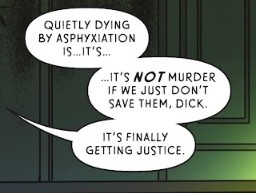
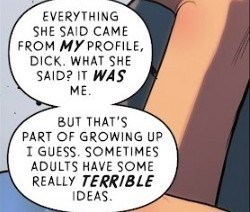
Not only that, but Tim has shown this belief through his thoughts and actions before. Twice.
The first time goes all the way back to Robin 1991 #5. During the fight against King Snake, Tim kicked him through a nearby window, fifty stories above the ground. As King Snake's life hung in the balance, Shiva appeared and commanded Tim to kill him.
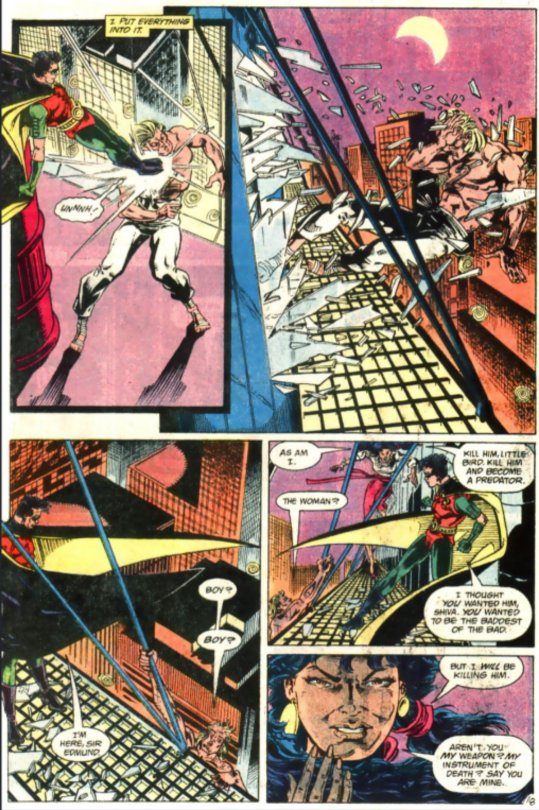
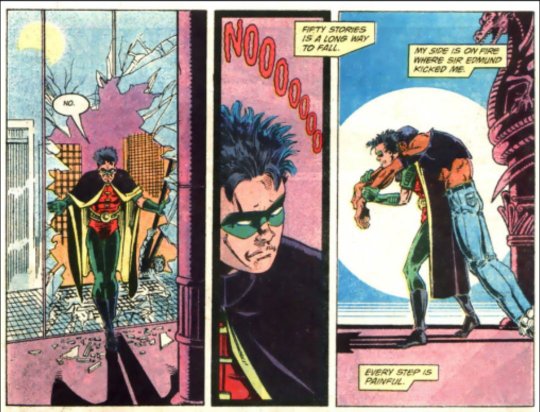
Tim refused. He walked away, leaving King Snake entirely at Shiva's mercy.
What gets me is that Tim made no move to save King Snake from falling. And he made no effort to stop Shiva from committing the murder, either. His only thought as he heard the man's scream was "Fifty stories is a long way to fall."
The second time was in Red Robin 2009 #26. Tim orchestrated a whole plan to manipulate Captain Boomerang into getting killed by Mr. Freeze. The whole time, Tim blamed Captain Boomerang for making all those bad choices, despite Tim being the one raising the chances of them being made. Tim believed he was innocent because he wasn't directly participating.
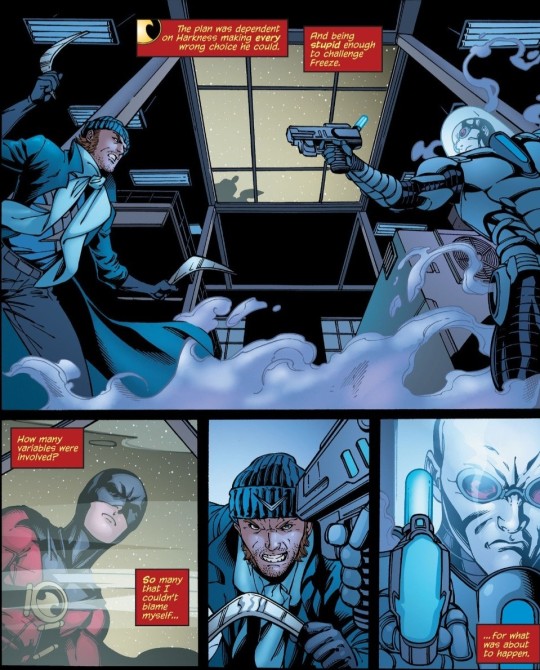
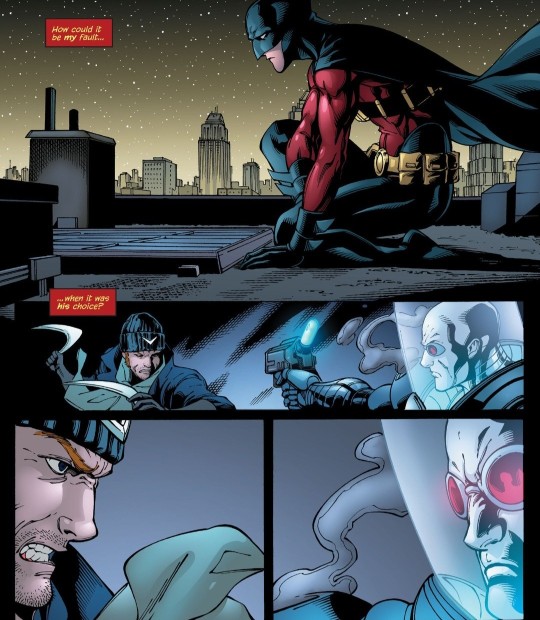
Tim then stopped that plan, but not for any noble reason. He decided that he couldn't let anyone else kill Captain Boomerang but himself.
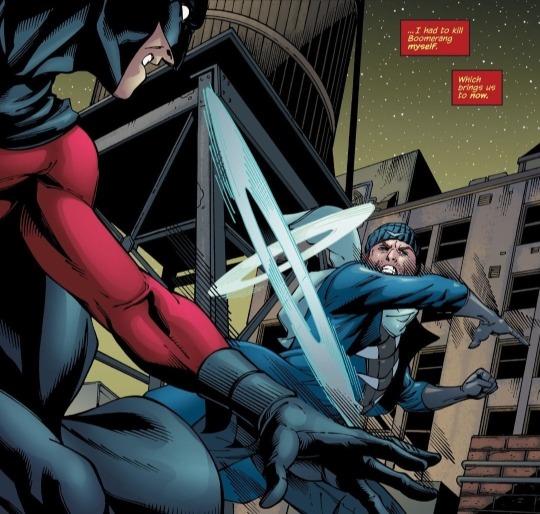
Tim couldn't bring himself to do that, either. So he had to spare his father's killer in the end.
This seems pretty cut and dry so far, right? Tim believing that letting villains die is alright as long he doesn't do the deed himself? I'd think so too, if there weren't other moments contradicting this.
In Robin #35, Steph insisted on leaving an enemy who got buried under the snow to die. Tim chastised her for it.
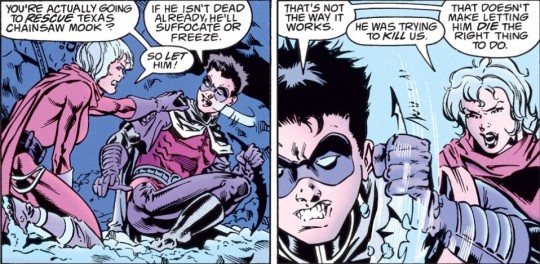
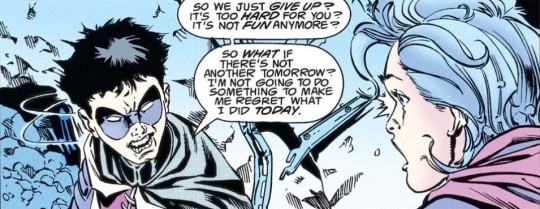
Neither of them were responsible for the snow, or for the enemy getting trapped in it. Plus, that guy tried to kill them with a chainsaw moments prior, so he's not exactly an innocent damsel in distress.
Maybe it was because this enemy wasn't a big enough fish to fry. We didn't really get confirmation that this guy has actually killed before, and he's around goon status at best.
But then in Robin #46, Tim chose to save another enemy who got himself into a deadly situation. That enemy was a murderer known as Young El. This time, Tim wasn't telling anyone else why they should save a murderer's life out loud. These were his private thoughts.
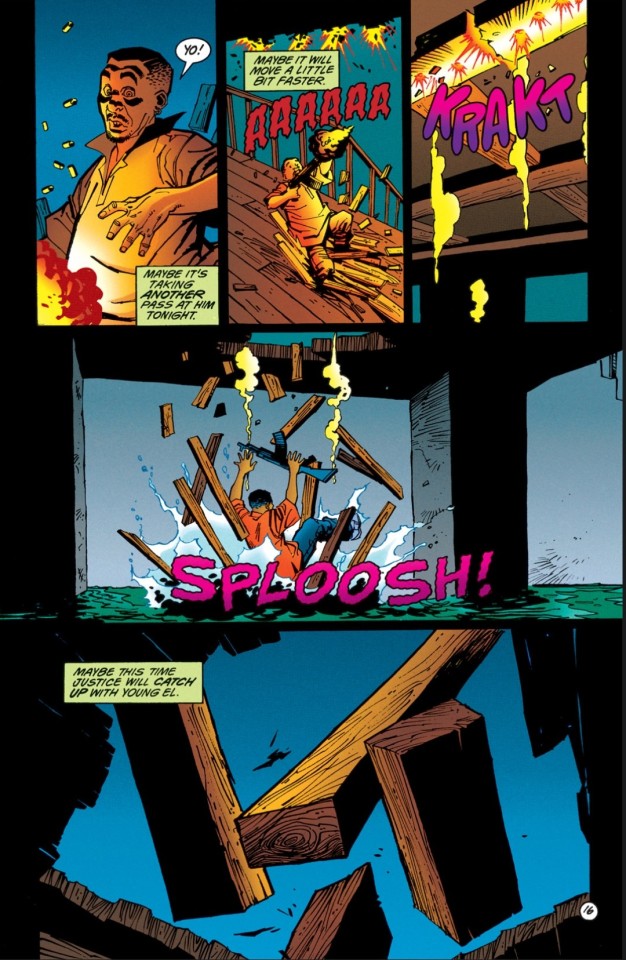
Notice how Tim's inner monologue sounded kind of on-the-fence. He contemplated justice finally catching up with Young El as the floorboards gave way, bringing a support beam down on him in the process.
However, Tim immediately switched gears to rescue Young El from under that beam before the water rose too high.
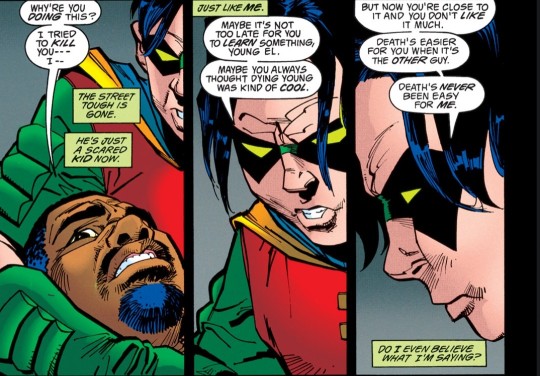
But Tim, as he told Young El the reasons he's saving him, asked himself "Do I even believe what I'm saying?" He could be asking this about two different things he said here. A) "Maybe it's not too late for you to learn something, Young El.", or B) "Death's easier for you when it's the other guy. Death's never been easy for me."
For Tim to doubt his belief in either of these statements is very interesting. He could be questioning if Young El is already too far gone for redemption, or he could be questioning if seeing someone die has never been easy for himself. For all we know, it could be both.
Unfortunately, Tim never got to see if his choice to save him would pay off. Tim wasn't strong enough to lift that beam, and Young El drowned.
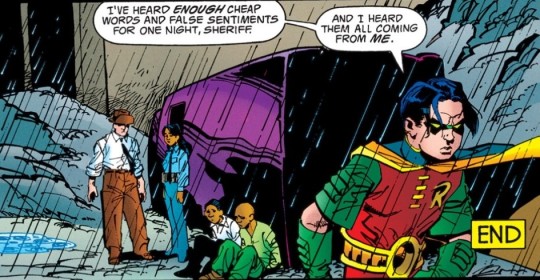
There's a question on my mind as I read these pages. What makes this murderer's death different from when Tim let King Snake fall to his "death"? Sure, King Snake didn't actually die, but Tim didn't know that until later when the man came looking for revenge in Gotham.
Tim was once able to simply walk away from what he was certain would be a killer's demise. But then he's consumed by guilt over not being able to prevent a different killer's death down the line, to the point of hallucinating.

On top of that, what changed Tim's mind later? Red Robin #26 and Robins 2021 #3-6 still happened in the future. The only significant difference I can tell is that these two comics involved the killer's of Tim's parents, making it personal. But if the Imposter from Robins 2021 got his beliefs from his profile before his mother's killer got involved, then does that still hold up?
Maybe we should put a pin on it for now. There are other things Tim's done that brings the details of his no-kill rule into question.
Such as that one time Tim actually killed someone with his bare hands.
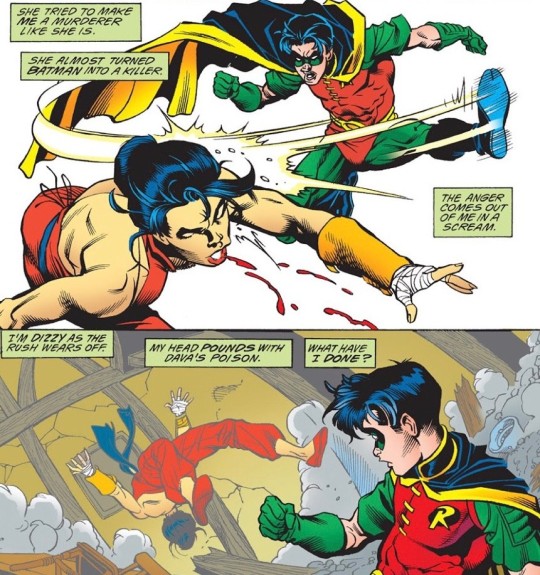
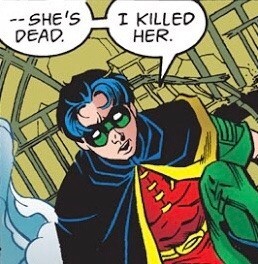
In Robin issues #51-52, Tim accidentally killed Lady Shiva while drugged on amarilla, a plant that enhances the user's speed beyond human limitations.
It may be argued if the amarilla altered Tim's mind enough to excuse him of fault or not. However, I want to focus on what happened after Shiva was revived. Here's another question to go with the first one:
Does Tim believe the kill still counts if the victim was revived afterwards?
From what I've gathered, yes and no. It's kind of complicated.
After Tim killed Shiva, he was understandably distressed about it, about how he can never take it back.
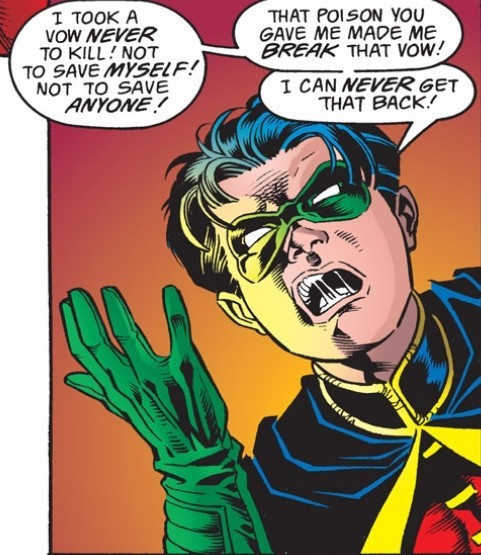
But after Shiva came back to life? Nothing. He didn't dwell on the fact he broke the vow to never kill. For something that devastating to happen in his life, it's odd that Tim didn't bring it up ever again, privately or otherwise. Especially considering what happened later in Robin #123, when Tim thought he killed Johnny Warlock.
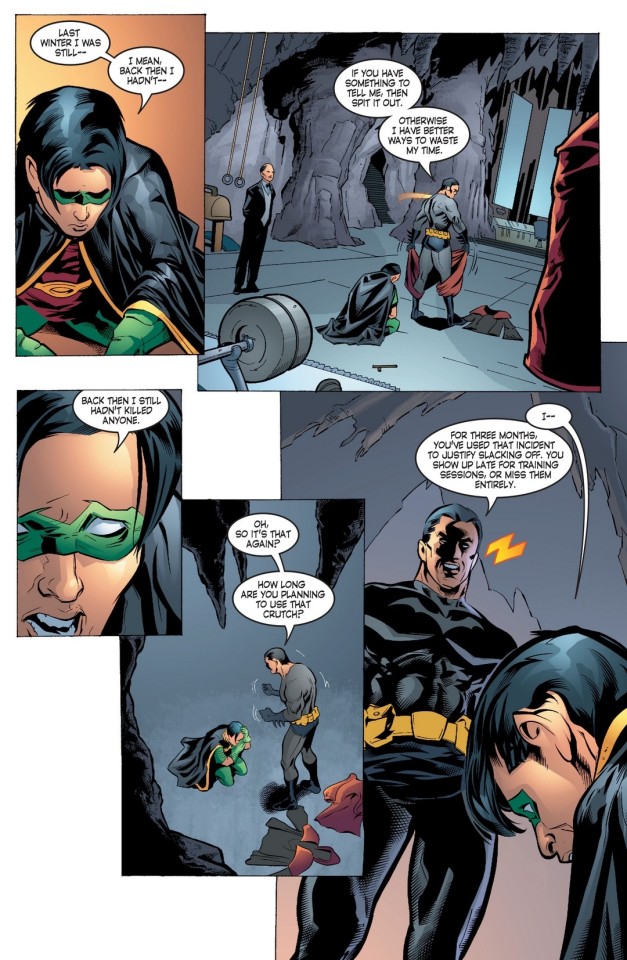
Tim was utterly inconsolable. He lost all faith in his abilities as Robin, and in himself as a whole. It also contributed to his decision to quit being Robin after his dad found out. In general, he seriously dwelled on that "kill" for a much longer time than he had after killing Shiva. The difference being that he knew Shiva was resuscitated immediately afterwards, while Tim didn't know Johnny survived until issue #141.
But there's the fact that Shiva really did die. Her heart and breathing both stopped. So are we to believe Tim moved on from that so easily because she's alive now? What happened to never getting that back?
Come to think of it, not long after Tim killed and revived Shiva, there was someone else who landed in that same boat. Dick.
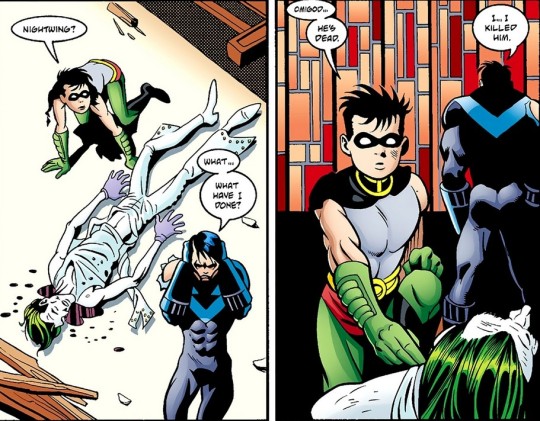
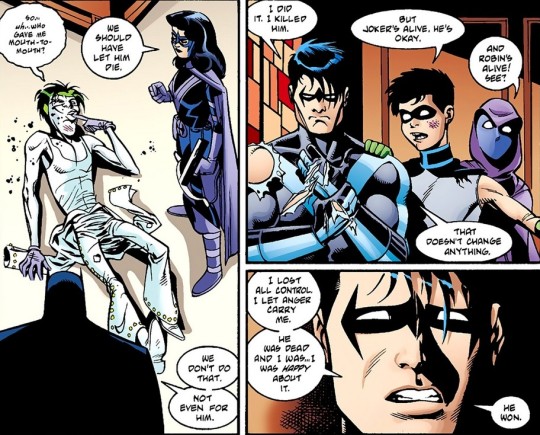
In Joker: The Last Laugh #6, Dick brutally attacked the Joker after believing he killed Tim. Dick ended up accidentally killing Joker instead, before the clown was resuscitated.
Here's the thing. While Tim was trying to comfort Dick, saying that it's ok because Joker's alive now, Dick didn't believe so. He was still distraught that he killed someone. The fact Joker came back to life afterwards didn't matter to him. To Dick, it still counted. So what does that say about Tim?
Before we move on, there's another person Tim knows who also died and came back from the grave. Jason.
Tim openly acknowledged Jason was killed before coming back, too. Multiple times. For example, when they met up in Red Hood and the Outlaws 2011 #8.
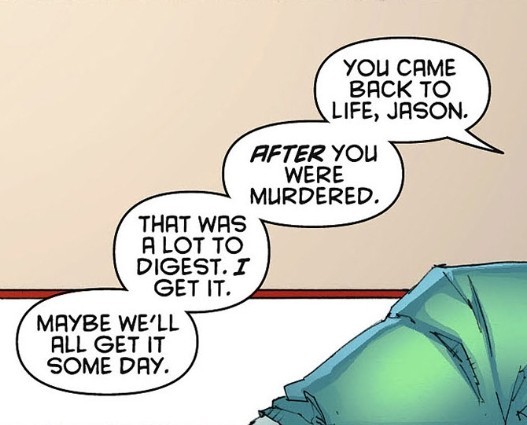
Tim hadn't shown any signs that he thinks Jason's murder doesn't count anywhere, except for maybe once.
In Knight Terrors: Robin #2, Tim and Jason had a heart-to-heart, and Tim said something strange.
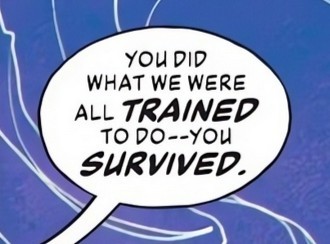
"You survived."
Except Jason didn't survive. He died. To say Jason survived that night would've meant he never died to begin with. Him being alive now doesn't change that. Was this Tim telling a white lie to make Jason feel better? Or does Tim see being revived after death as "surviving"?
Ok, now we can move onto the next question. Or rather, bear with me as we go back to the first question. It's a broad topic with plenty more to talk about.
What does Tim count as breaking the no-kill rule?
We already asked how Tim feels about bringing villains back from the dead after killing them. And we asked how Tim feels about leaving a villain to die without getting directly involved. However, we still don't know how much involvement Tim needs to have in an enemy's death before he'll take responsibility for it.
We can confirm he won't mercy kill in Red Robin #21, even if it means giving someone a fate worse than death. No exceptions.
Tim also doesn't allow anyone he's actively teaming up with to kill, especially if he's the one in command. He's been amicable with known killers before (Huntress and Pru, for example), but only when they remain non-lethal while working alongside him.
Apart from that, though, it becomes less clear. However, I think this is a good place to expand on when Tim blew up a lot of League of Assassins bases in Red Robin #8.
I'm not going into whether or not those explosions actually killed anyone. I've seen evidence supporting both sides of this debate, so I'm just going to say it's up to interpretation. What I AM talking about is whether or not Tim would've felt responsible if they had killed someone.
Before overloading every generator in the LOA database, Tim gave a warning to the Wanderer. He told her that he couldn't be held responsible for what would happen to her if she didn't leave.
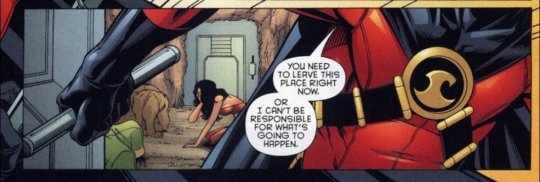
After initiating the explosions, Tim warned the White Ghost that they had fifteen seconds to leave before it was too late.
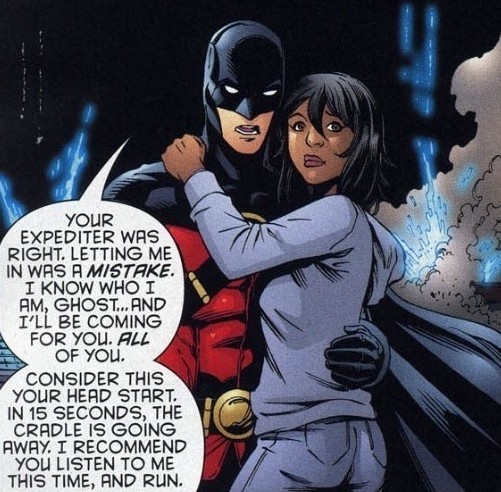
Fifteen seconds. That explanation on the mistake of letting him in might've taken roughly another fifteen to twenty seconds. Did the other bases even get a full minute head start? The way some of the people were already running away could imply they at least got a warning, but it's possible they might not have.
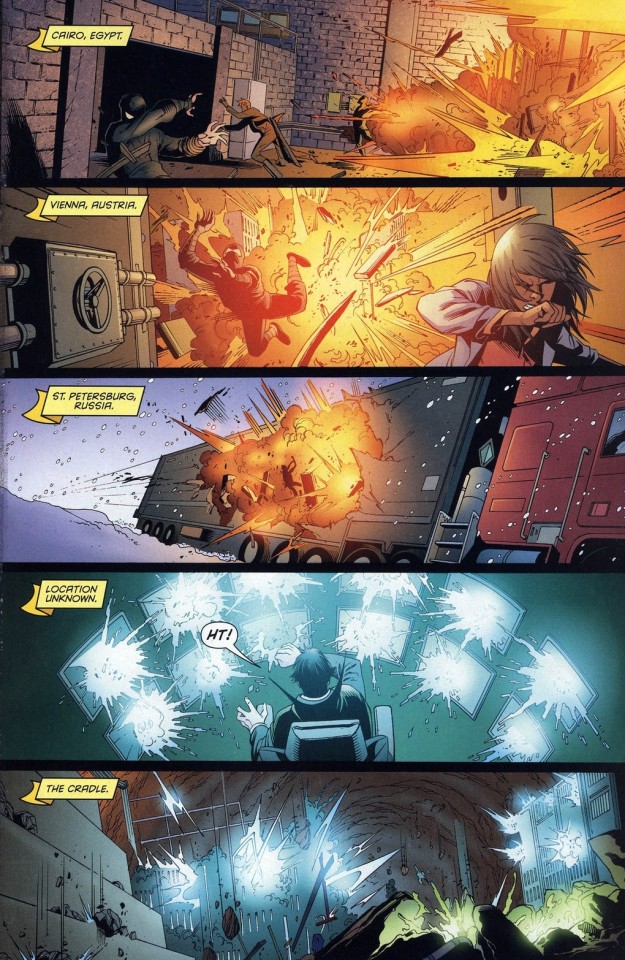
Even if everyone in every base received a warning, would that be enough for Tim to avoid holding himself accountable if they didn't make it out in time? Tim's the one who rigged the bases to explode, but I guess giving someone a warning means it's now their fault for not heeding it?
We can't be sure he even considered the possibility of those explosions killing anyone. Tim knew they were dangerous enough to bring the whole Cradle down, and the other ones we saw looked pretty powerful (except the ones in Ra's hideout). But Tim also called Ra's a murderer right after that happened, which would've been very hypocritical if Tim himself thought he committed murder.
So, my guess is either A) Tim relied on sheer luck for those explosions not causing any casualties and chose to believe they hadn't, or B) Tim didn't believe the deaths of anyone caught in them would be his fault.
Again, this isn't about whether or not blowing up the LOA bases killed anyone. It's about how willing Tim was to take that risk, and if he would've blamed himself for anyone getting killed from it.
Either way, it's canon that Tim had no guilt for the explosions he caused, or for anything he did before Red Robin #22. Just ask the Sword of Sin.
This is an exerpt I got from the Fandom DC Database on the Sword of Sin:
"The Sword of Sin can be ignited with the mind of the wielder, if the person is powerful enough. The sword has the ability to conjure in the mind its victims all of the sins for which they are guilty or have not atoned for."
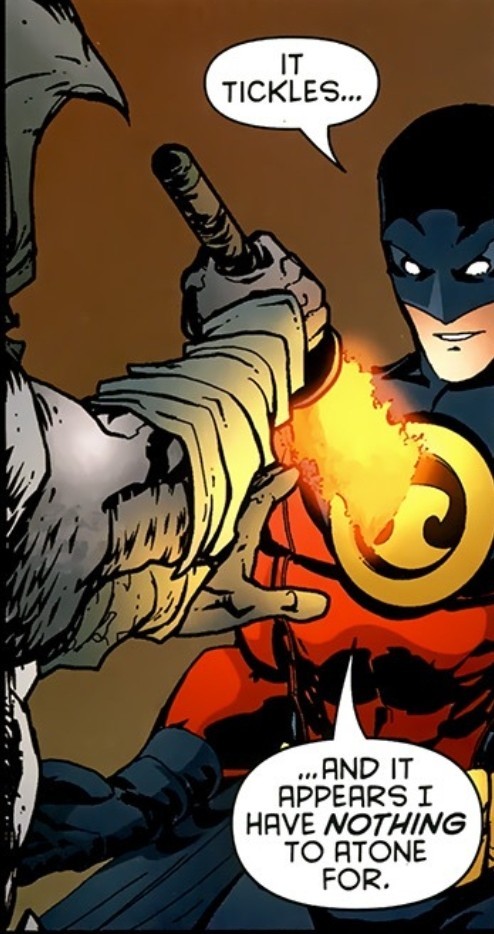
When Tim was stabbed with this sword, he was immune. The Sword of Sin decided he was innocent. Although, I have to ask how reliable this sword was in making that judgement. If the sword is judging others based on its own set principles, then something's not right here.
The Sword of Sin was also used on Dick, and he wasn't immune. It dug into Dicks subconscious and unearthed memories he'd long since repressed. Memories of himself watching a boy get beaten to near death, and then doing nothing. He just walked away.
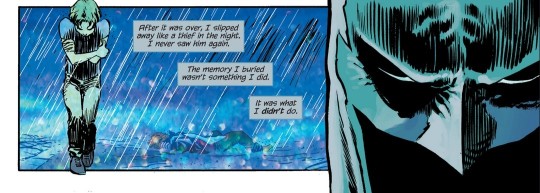
Now, tell me why the sword brought this to light, but not the time Tim left King Snake to die!
It wasn't an accident. Tim deliberately chose to leave instead of trying to save this man from the murderous Lady Shiva. Sure, Tim was no match for Shiva and he might've not been able to stop her, but the same could be said for an eight year old Dick not stopping a group of much older kids. Neither of them tried to stop the attackers.
Tim didn't atone for it, either. When King Snake returned in Batman #469, Bruce told King Snake that it wasn't Tim who left him to die. We know that's a lie, but Tim never corrected this. He let Shiva take all the blame.
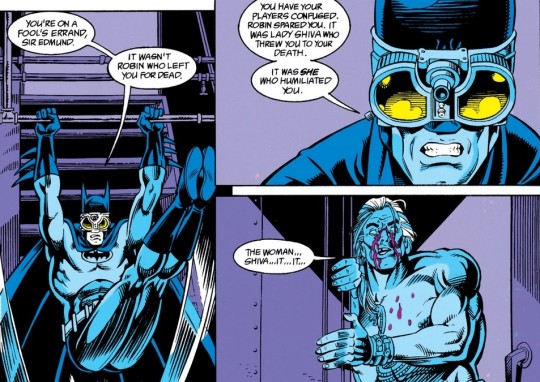
We have two instances of a boy choosing not to prevent someone from having a near death experience. One guilty, and one innocent.
Did the Sword of Sin think Tim was justified because King Snake was corrupt? That doesn't sound holy to me.
Was it because Tim didn't feel any guilt over it, while Dick did? Can the sword's judgement be thrown off by the victim not feeling any shred of guilt over their actions, even subconsciously?
That could make sense given what we know Tim did in the past: King Snake falling, the vandalism (explosions), and ALL the lying over the years (Tim reviving Shiva might count as atonement, so I'm not including that). If the sword based its judgement on God's will alone, then odds are high it would've picked up on one of these.
Even so, I'm not going to sit here and say this is definitely the case. I'm not familiar enough with how the sword effects other characters to make that call.
If this is indeed false, then did the DC universe's version of God decide to pardon Tim of his sins when he prayed earlier that same issue, despite him not believing he had any? I mean, who knows, right?
You can probably see why there's more questions than answers. The point is Tim didn't have any guilt for the things he did before Red Robin #22. Tim was canonically convinced he had nothing to atone for.
So then why did he say the opposite later in Knight Terrors: Robin #2?!
In the heart-to-heart between Tim and Jason, Tim tells him this:
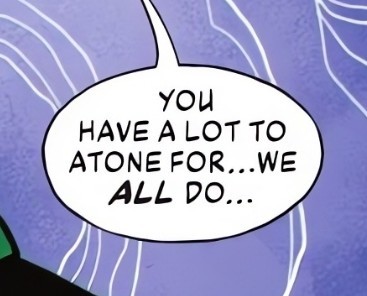
"You have a lot to atone for...We all do..."
Tim knows that the words "we all" include him, right? By saying this, Tim admitted to also having things he needs to atone for, right?
Is this another white lie to make Jason feel better? Is it one of those slight changes the New 52 made to the canon? If not, then why did he change his mind? Did his no-kill rule change and make him feel guilty for some past actions? Is it not the no-kill rule, but something else?
What changed?!
Where does Tim draw the line?
I don't know. We've narrowed it down to a general area, but it's kinda hard to see a line when it's so blurred it could be a gradient.
Tim baffles me. He acts as a steady moral compass for others when he can't even seem to stay consistent with his own. You're free to call it poor writing (and honestly, fair), but I find his hypocrisy fascinating.
That's what it is, isn't it? Tim's a hypocrite who's completely oblivious to being one. And it's not like this was never mentioned in the comics before. Damian called him out on it!
In Batman & Robin 2011 #10, Damian confronted Tim about his near-murderous reaction when Fist Point killed Artemis (Teen Titans Vol 4 annual #1). Damian then accused Tim of constantly rejecting him because they have more in common than Tim's willing to admit.
It's debatable how accurate that accusation was, but Tim had a pretty volatile reaction to it.
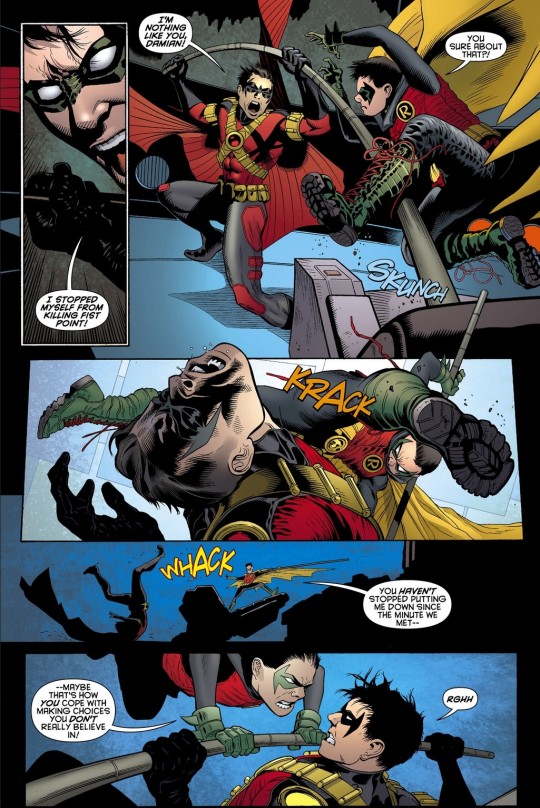
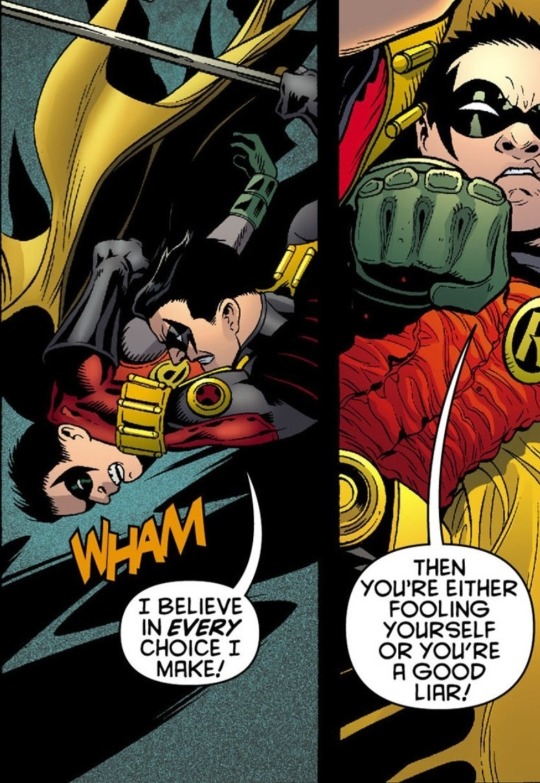
"I believe in every choice I make!"
Does he? I don't think someone who's so sure of what he believes in would contradict himself to this extent. Especially if he wasn't doing it on purpose.
He wouldn't vehemently push Bruce's no-kill rule onto others and berate them for bending that rule, only to go and bend that same rule himself when the Batclan isn't around. He also wouldn't exploit what he thinks are loopholes, decide later that those loopholes broke the no-kill rule, and then earnestly claim he never broke it.
Why is he like this?! He's had arguably the most normal childhood out of the whole Batclan before becoming Robin! What could've made him so fickle about this?!
Where does he draw the line? And how will he know when he's crossed it?
#batman#dc#robin#tim drake#red robin#theory#analysis#long post#tim drake is a menace#unhinged tim drake#To think all of this was written without mentioning Tim's corrupt future selves#or the numerous times he's actually contemplated or attempted murder#Believe me I would've loved to add 5-10 more screenshots of those moments alone#but I hit the 30 image limit :(#Anyway I want to study Tim in a lab#Feedback is welcome#I'm aware I hadn't read all the DC comics so I could've missed something
784 notes
·
View notes
Text
On Lucanis and ace representation
I have mixed feelings about it. Spoilers ahead, obviously.
On the one hand, I have been writing ace representation into Dragon Age fandom for at least five years by this point; I have made posts speculating which characters in the franchise could be read as aspec, I have critiqued the conflation between apparent aspec identities and brokenness that happens so often in mainstream media, and I have longed for a canonically aspec character in the stories I love. To me, however, this new declaration about Lucanis does not feel like a victory.
It feels convenient.
Mary Kirby tweeted six months ago that she specifically wrote Lucanis to be a disaster bisexual, not panromantic demisexual. In the real world, of course, people can discover new things about themselves and change their labels, and it’s fine. The problem is that Lucanis is not a people, he is a character with a static set of responses to a limited set of inputs from the player. In other words, he is what he is. That this change in Word of God about his sexuality comes directly on the heels of the very poorly received AMA from the devs is something I don’t view as a coincidence.
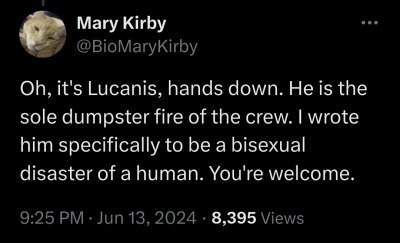
To be clear, this isn’t an attack on Mary Kirby, nor is it a tantrum about not getting a sexy Zevran 2.0. I am ace – I love slow burn emotional depth before physical intimacy, and I was drawn to Lucanis because of his struggles with alienation and the softer playfulness that’s there to see if you look for it. (And the voice, and the wings, but that’s not relevant here.) However, there is something severely lacking in the connective tissue of his romance. For the first two thirds of the game he is unresponsive to flirting to the point where the game feels like it’s bugged. Multiple people have pointed out that it’s almost impossible to tell when the romance is locked in without looking at the companion screen – I myself only realised when took him to Rivain with Taash and they started talking about him popping out the wings. The idea that this woodenness was a deliberate choice does a disservice to everyone who has pointed out a valid critique of the content – mechanically, rather than narratively – of the romance.
It is also immediately contradicted if you don’t romance Lucanis. Because instead he gets together with Neve in a relationship that not only lacks the emotional closeness that is required for Rook to lock in a romance, but also gets physical far more quickly, which is the exact opposite of how demisexuality works. For Rook, romancing Lucanis requires repeated declarations of support and care, and he will only fully reciprocate once they have battled through his inner demons to encourage him to start healing from his trauma. Even after that there is no physical touch between them until after Rook is pulled from the Fade prison. Neve, meanwhile, is one of the locks on his cage, but creates a ‘hats off’ rule for Spite. It's like watching Aveline run around finding marigolds for Donnic all over again. Not to say that all ace experiences are the same, but if someone described these two relationships to me, I would assume only one of them involved a demisexual character.
Truthfully, however, this isn’t really about the evidence for whether Lucanis is or is not demi. You could argue that back and forth all day because interpretation goes both ways. For example, he says he’s inexperienced in relationships, but then he’s arguably more competent than the other companions who ask you for romantic help, more lacking in confidence than skill – and analysis of that is a whole other post. But it’s not useful. There isn’t one way to be aspec, and I’m certainly not saying he can’t be read that way.
What this is about is the way representation feels like it has been retconned in as a response to the genuine critiques brought up in the AMA and elsewhere. Excusing the gaps in his romance by saying it’s because he’s demisexual feels like a cheap attempt to divert attention away from weak character writing. Perhaps I’m just being cynical, but after all the dodged questions and misrepresentations from the devs in almost every aspect of this game, if Lucanis had been planned as aspec from the beginning then the TRANS WOMEN ARE WOMEN game would have made a huge thing of it. I know this, because they did it already, they stated all the companions were pan (except for Lucanis who was bi).
And I don’t know what’s worse: it not being planned and only trotted out as a smokescreen to avoid engaging with the flaws in the writing; or it being there from the beginning without any care for how it might look to have the ostensibly aspec character be a literal abomination whose interpersonal issues stem from being imprisoned and tortured. Again.
A good slow burn would have addressed Lucanis’ relationship to attraction, though hopefully with more nuance than Taash was allowed. A good slow burn would have not made one character exchangeable for another in a romance regardless of the personal journey Lucanis can only take with one of them. A good slow burn would have at least had him reacting to the things the PC says to him. But this is not a good slow burn and the devs are using a token attempt at queer rep to cover for whatever went on behind the scenes to give us such a patchy final product.
#i dislike word of god as a general rule#this is why#datv critical#bioware critical#lucanis#lucanis dellamorte#asexuality#demisexuality
500 notes
·
View notes
Text
Original post:

amirdrassil: "datamined veilguard character descriptions google doc is now complete. i've even organised all the characters into their respective factions and added a clickable table of contents!! yippee!!! [link]" [source]
Please note that this work and document resource was put together by amirdrassil on Twitter! they kindly gave me permission to cross-post it here. 🙏
DA:TV spoilers and long post under cut.
VEILGUARD DATAMINED CHARACTER DESCRIPTIONS These are all taken directly from the game files; wherever a character had interesting additional information such as accent, age range, or appearance, I’ve also included it.
GODS & SPIRITS
RETURNING CHARACTERS
COMPANIONS
CROWS
VEIL JUMPERS
WARDENS
SHADOW DRAGONS
LORDS OF FORTUNE
MOURN WATCH
KAL-SHAROK
MISCELLANEOUS
UPDATE (19/11/24): Added Teia, Viago, Anaris, Aelia, Hezenkoss and Rana. (Thank you to @/ZILVYR on Twitter for finding these ones!) I did my best to look through the files as thoroughly as I could, but if you find any more I missed, feel free to DM me on Twitter (@amirdrassil) and I’ll add them with thanks. :-)
I’m adding a disclaimer here, because I’ve seen a lot of people treat these datamined descriptions as absolute canon. Many of them are remnants of scrapped or altered storylines, meaning that they no longer align with the finalised story that the game presents. Please take everything you read here with a grain of salt, and where the game’s content itself directly contradicts the datamining, the former should always take precedent over the latter. At least as far as “canon” goes! And of course, it goes without saying, but please don’t use any of this datamining as an excuse to be mean to anyone; please understand that game development is a lot of hard work, and storylines are scrapped all the time as writers get new ideas or are faced with inevitable roadblocks from the game system side of things! No matter what, Veilguard was made with love. Anyways, feel free to use any of this as fuel for fanfiction, fanart, headcanons, or just healthy discussions about what the game might’ve been. Thank you very much, sorry for rambling and please enjoy!! :-)
GODS & SPIRITS
SOLAS AGERANGE: 40 CHARACTERDESCRIPTION: Solas, from the previous game. (Some characters also have a TTS voice assigned to them, and Solas’s is “PeterSad22k_HQ”, which makes me laugh/cry, as no other major character so far has had their TTS voice specified as being the “sad” variant.) ELGAR’NAN AGERANGE: 99 ACCENT: British Isles; an ancient contemporary of Solas. CHARACTERDESCRIPTION: Ancient elven god-king. Blighted. GHILN’NAIN AGERANGE: 35 ACCENT: British Isles; an ancient contemporary of Solas CHARACTERDESCRIPTION: Ghilan'nain is our sinister Mad Scientist god. Analytical and curious, she uses magic to mutate people into powerful but disturbing forms. She often lists things in a clipped fashion, cataloguing as she sees. She's obsessed with experimenting on all kinds of living beings, viewing everyone (except her fellow god, Elgar'nan) as potential "stock". She's pitiless about her work—Ghilan'nain will happily slice open a hundred people for parts—but is not purposefully sadistic. It's nothing personal. She can be angered, however, by people interfering in her plans. When she is, rage runs cold. Some backstory: Ghilan'nain is an ancient, now corrupted, elven god. She rose to power thousands of years ago by creating living wonders, and had the distinction of being the only mortal elf uplifted into the pantheon. She embraced the corrupting power of a force called the blight in order to improve her magic, and has been unalterably twisted by it over the centuries. BETRAYAL OF FELASSAN CHARACTERDESCRIPTION: A powerful undead born from Solas's regrets and betrayals (in this case, Solas's murder of his friend Felassan by stabbing him in the back).
FALL OF THE PROTECTOR CHARACTERDESCRIPTION: A powerful undead born from Solas's regrets and betrayals (in this case, the death of Mythal). SLAUGHTER OF THE PILLARS CHARACTERDESCRIPTION: A powerful undead born from Solas's regrets and betrayals (in this case, the murder of the Titans). SPIRIT OF PROFIT CHARACTERDESCRIPTION: A Spirit of Profit who has set up shop in the Crossroads. They are friendly, but very single-minded and tend to speak in one or two word sentences, mostly about profits. SPEECHPATTERN: Simple, clear expressions of intent. This merchant is a spirit with a singular mind (i just thought this one was neat!) GENERAL FELASSAN AGERANGE: 40 CHARACTERDESCRIPTION: The second in command of a resistance army. You've an elf who's fought against the tyranny of your gods, cruel despots who've enslaved your people. You're practical, level-headed, and have good sense for what other people are feeling, which makes you well-suited for your role. Your leader is an elf called Solas, a powerful mage who isn't quite the people person you are. You respect him, and are there to help him with whatever he needs - especially when he needs guidance about being the face of a resistance. THE CARETAKER SPEECHPATTERN: Simple, mysterious, with a sense of vast wisdom and power ARCHETYPE: Angel / otherworldly helper who gives the player what they truly need, not necessarily what they think they want. CHARACTERDESCRIPTION: A mysterious masked and cloaked spirit. They are patient, otherworldly, and helpful... in their own way. The Caretaker is the guardian of the Lighthouse, a magical shelter. Unknown to the player, the Caretaker is what remains of a truly ancient dragon, who long ago took on the form of this spirit. Underlying their patient and otherworldly nature is a sense of strength. The Caretaker was summoned centuries ago by ancient elves, the original builders of this place. Now it has new inhabitants: the player and their friends. You're guiding them through the mysteries of the Lighthouse, but do not give any straight answers. It's important to you they bridge the gap themselves. NOTE: The Caretaker is referred to as they/them because they're a supernatural entity (as opposed to the more normal human non-binary characters in the game.) We'd like a feminine voice to differentiate them from some of the other spooky/mysterious spirits in the game who sound masculine (e.g. Vorgoth.)
SPIRIT OF CHAOS CHARACTERDESCRIPTION: A spirit of chaos and freedom, unleashed by Solas to break through a labyrinth to his ally Mythal. SPIRIT OF NEED CHARACTERDESCRIPTION: A spirit heavily implied to be the Caretaker in another era, speaking with Solas about the attempt to rescue Mythal. Speaking with the spirit, Solas makes it clear that he will sacrifice anything to save Mythal. ANARIS AGERANGE: 35 (no other info except what’s in cyrian’s description) XENON THE ANTIQUARIAN CHARACTERDESCRIPTION: A nobleman who made a deal for immortality which did not include eternal youth, Xenon is the master of the Black Emporium, a shop selling curiosities from his personal collection of magical items.
RETURNING CHARACTERS
THE INQUISITOR AGERANGE: 30 APPEARANCE: Inquisition uniform under a long cloak with hood. ARCHETYPE: Relatable leader and mentor CHARACTERDESCRIPTION: The Inquisitor, the protagonist from DA:I. Confident, knowing, they are still the head of a powerful organization, but now act in a mentor role. They would bring too much attention if they get personally involved, so they are looking for the right people to act for them. CHARTER AGERANGE: 30 CHARACTERDESCRIPTION: A returning character from DA:I, Charter serves as Rook's link to/mouthpiece of the Inquisitor and what's left of the Inquisition. VARRIC CHARACTERDESCRIPTION: Varric! DORIAN CHARACTERDESCRIPTION: It’s Dorian! MORRIGAN AGERANGE: 40 SPEECHPATTERN: Morrigan-y. CHARACTERDESCRIPTION: Returning character from previous games. ISABELA AGERANGE: 50 APPEARANCE: Well-aged but perfectly maintained warrior gear for close and brutal fighting. Two possible appearances, depending on how the player resolves her past: 1. Dark black dyed hair 2. Red hair with streaks of grey CHARACTERDESCRIPTION: Isabela from Dragon Age II
COMPANIONS
HARDING AGERANGE: 29 ARCHETYPE: Girl-next-door CHARACTERDESCRIPTION: Scout Lace Harding, from Inquisition. It's been almost a decade and Harding's a little older and wiser, but she still thinks of herself as the simple country girl from Ferelden. Harding is cheerful and friendly, and always tries to be positive. She is kind, warm and compassionate, quick to laugh and slow to anger. EMMRICH AGERANGE: 50 CHARACTERDESCRIPTION: Follower - will have an audition script. MANFRED CHARACTERDESCRIPTION: An undead skeleton that serves as Emmrich's faithful assistant and companion. Manfred is curious, loyal, innocent, and wants to be helpful. He doesn't speak at first, only replying in hisses that express his mood. Over the course of the game, however, as he learns more, Manfred eventually surprises everyone by speaking in short, one or two word sentences. ASSAN (listed as “GRIFFON”) CHARACTERDESCRIPTION: Davrin's griffon. A VO character so he can squawk and screech during banter and ambients. LUCANIS AGERANGE: 36 ACCENT: Hint of Italian, but not as strong as Zevran's. (He is from a coastal city in Antiva, which had an influx of Tevinter refugees from Seheron after the Qunari invaded 100 years or so ago. That’s why he looks and sounds different from Zevran and Josephine.) APPEARANCE: Lean, sinewy, handsome, but haunted Antivan human man. Mid thirties. CHARACTERDESCRIPTION: Once the heir to the First Talon and the Antivan Crows' best mage killer, Lucanis now bears scars both physically and mentally from his time as a brainwashed executioner for an evil mage cult. No longer the pragmatic assassin always in control, he wrestles with becoming what he’s spent his life hunting: a demon-possessed abomination. He longs to return to his former glory, but the monster inside him demands blood and vengeance. With his future hanging in the balance, Lucanis must decide whether to give into the demon or control it.
DAVRIN (he doesnt have anything aaaaa) BELLARA (she doesnt have anything either aaaaaaaaaa) NEVE AGERANGE: 30 CHARACTERDESCRIPTION: A mage who knows the streets of Minrathous, Neve helps investigate crime in Tevinter's capital. Hired by Varric to assist in the fight against Solas, Neve brings her unique blend of time and ice magic, along with her investigative skills, to the team. Neve is clever and driven, with a dry-but-playful sense of humour. She can be cynical about the world - especially Minrathous - but she believes in doing the right thing herself and has a strong sense of duty. TAASH CHARACTERDESCRIPTION: Taash is a Qunari agent with a specialization in infiltration -- a thief, basically. She can scale buildings, pick locks, and take out enemies with quick and brutal efficiency. She is also blunt and laconic -- more likely to answer with a single word than give you a big long monologue. She's not grumpy as much as badass deadpan -- she doesn't trust people in general, and she doesn't like thinking or talking about her feelings, but she believes in what she does. (Taash correctly has the “NonBinary” gender tag, but unfortunately the CharacterDescription field misgenders them. However, it also seems there are some things here and there that changed in early development, like the Qunari agent thing.)
CROWS
TEIA AGERANGE: 28 ACCENT: Italian/Spanish SPEECHPATTERN: Warm APPEARANCE: Elven female, mid to late twenties CHARACTERDESCRIPTION: Passionate, showy, hot-blooded, flirtatious, and arrogantly confident. Teia believes she's a celebrity athlete who will die gloriously before she gets old and live forever in song. She has no guilt about being an assassin, and thinks anyone who judges her for it just doesn't understand how things work in Antiva, or indeed anywhere in the world where powerful men play games. Abandoned as a child, she has a soft spot for the downtrodden. VIAGO AGERANGE: 32 ACCENT: Italian/Spanish SPEECHPATTERN: Formal, hint of snobbiness APPEARANCE: Human male, early thirties RACE: Human (Brazilian) CHARACTERDESCRIPTION: Calm, ambitious, and ruthless, Viago is the bastard son of the late King of Antiva. As a high-ranking member of the Crows, Viago has just as much influence as the Monarchy, but he still resents the fact that he is not a legitimate heir and feels his birthright was stolen from him. Beneath his cool exterior is a lot of anger and frustration. He will not be satisfied until he sits upon a throne. ILLARIO AGERANGE: 35 SPEECHPATTERN: Charming but with a hint of smarminess. ACCENT: Italian APPEARANCE: Ativan pretty boy CHARACTERDESCRIPTION: Antivan pretty boy. Mid 30's. Illario is a power hungry assassin who cares only for himself. On the surface, he is a fun-loving, upperclass Antivan with a weakness for wine, duels, and gambling. But beneath that shallow facade is a calculating, ambitious man with grand plans for the Crows.
SPITE SPEECHPATTERN: Taunting, sing-songy, creepy CHARACTERDESCRIPTION: The demon trapped inside Lucanis's head. Spite was once a Spirit of Passion drawn to Lucanis's will to live, but years of torture and a desire for revenge has twisted him into a Demon of Obsession. CATERINA AGERANGE: 80 ACCENT: Italian/Spanish APPEARANCE: Older Korean-Spanish or Korean-Italian woman (from the same region as Lucanis). Can easily play the part of both sweet grandmother and mafia boss. CHARACTERDESCRIPTION: The Godmother of the Antivan Crows. Sassy, ruthless older woman of power, who will do anything for the success and protection of her family/house. ZARA AGERANGE: 35 APPEARANCE: Beautiful human mage. Mid 30’s. SPEECHPATTERN: Soft and teasing with a Tevinter accent. Upperclass, so formal, but not cold. More of a sensual snob than an ice queen. CHARACTERDESCRIPTION: A vain, hedonistic Tevinter Magister, who uses the blood of her slaves to stay young and beautiful. She is Lucanis's nemesis and is the one responsible for forcing a demon inside his head. CALIVAN AGERANGE: 55 SPEECHPATTERN: Formal, snide CHARACTERDESCRIPTION: Calivan is the prison warden in charge of the Ossuary. He is as cruel as he is curious and likes to experiment on his inmates with blood magic. GOVERNOR IVENCI AGERANGE: 45 SPEECHPATTERN: Formal, curt, demanding APPEARANCE: A Trevisan government official. They don't go around armed, because they secretly know they don't have anything to fear from the occupation. ARCHETYPE: Money-respecting Official demanding the heroes stop disrupting the status quo. CHARACTERDESCRIPTION: Governor Rayan Ivenci is a non-binary human, about 45, Trevisan with a Caucasian appearance. They used to be a mercenary and still have the skills, but have softened somewhat as they aged. They have been a government official for a decade, and have grown sick of being a toothless figurehead. The Crows are the true authority in Antiva, relegating officials like Ivenci to almost symbolic bookkeepers. Ivenci thinks the Crows are spoiled mascots, and Treviso should be ruled by serious figures who don't waste time on petty rivalries and theatrics. Ivenci allowed the occupation and has made steady profit from it, selling out Treviso with the intent that the Crows would be killed fighting the Antaam, expecting that and when Antiva eventually ousted the Antaam, Ivenci would solidify power before Crow houses in other cities could re-establish here. Under Ivenci, Treviso would be the thin edge of the wedge that ended the Crows power. But the Butcher didn't rampage, and didn't kill all the Crows. This has left Ivenci pretending to help fight the occupation, while also chastising the Crows for stirring up trouble. Once the Butcher is dead, Ivenci casts aside any pretense and simply takes power.
FLETCHER AGERANGE: 30 SPEECHPATTERN: Measured, serious. ARCHETYPE: Connected merchant guild leader ACCENT: Antivan APPEARANCE: Fletcher is a tradesperson and a skilled combatant with a bow. They are always dressed for travel. They aren't flashy, preferring to appear as their own guard instead of a merchant hawking wares. CHARACTERDESCRIPTION: Fletcher is a human Crow with merchant ties. Skilled in bows and ranged support, they are kitted for travel and protecting people and goods on the move. They are non-binary, tall with a thin build that codes slightly feminine. Ethnicity can be anything.
HEIR AGERANGE: 40 SPEECHPATTERN: Calm, measured. Almost dispassionate. ACCENT: Orlesian APPEARANCE: She is pale with short dark hair and an Orlesian accent. Dressed in good light armor befitting someone who trains others in small-weapon combat and takes the occasional hit. She was the assassin trainer in Inquisition, but it's been many years and doesn't need to match the appearance except in a general sense. CHARACTERDESCRIPTION: Heir is a Dalish elf who acts as a trainer and mentor for young Crows. JACOBUS AGERANGE: 15 ACCENT: Antivan SPEECHPATTERN: Sullen teen with an axe to grind APPEARANCE: Young, skilled, lithely muscled. Jacobus is well trained in double-daggers, but has the typical lack of discipline of an undirected teen. CHARACTERDESCRIPTION: Jacobus is a young male Crow who is in danger of losing himself to vengeance. He should be as young as we can make him. If he can't be a child, he should be no older than 15. His family were killed by the Antaam, and the hate is still fresh. Skilled in daggers, he is lithe and quick, but sullen in his mannerisms. He doesn't smile yet. Ethnicity can be anything. ARCHETYPE: Youthful spite for the world NOA DE ACUTIS AGERANGE: 55 ACCENT: Antivan SPEECHPATTERN: Formal with strangers, warmer with her brother. APPEARANCE: Older veteran Crow female duelist CHARACTERDESCRIPTION: Noa is an older female in her late 50s. She has been a Crow for all of her life, and remains capable and fit. Her build has the old-woman wireyness of a duelist's body that was fit her whole life. She is slow to smile, and is the more serious of the de Acutis siblings. Ethnicity can be anything, but needs to match her brother Neri encountered in the Crow plots. ARCHETYPE: Older sister, skilled assassin
NERI DE ACUTIS AGERANGE: 55 ACCENT: Antivan SPEECHPATTERN: Thoughtful, homespun APPEARANCE: Classic swordsman assassin, with an old-fashioned flare. He doesn't look dated, he looks distinguished. A godfather displaying modern tradition. CHARACTERDESCRIPTION: Neri is an older male in his late 50s. He has been a Crow for all of his life, and remains capable and fit. His build has the old-man-strength of a swordsman's body that was muscular his whole life, but has now lost some of the mass as he transitioned to a mentor or godfather role. He has a hard face, but is quick to a melancholy smile. Ethnicity can be anything, but needs to match his sister encountered in a later plot. ARCHETYPE: Stern but loving godfather FLEDGLING DARTONIA AGERANGE: 17 SPEECHPATTERN: Tentative due to inexperience. More confident after seeing Rook in action. CHARACTERDESCRIPTION: A young person in training to become an assassin. Nervous because of inexperience, but capable and willing. Farming background. Hunted for food. Now living in the city because the lands were lost to occupation. Dartonia and Temitri are encountered in the Crow sanctum, the Diamond casino. They chat casually with each other about how their training is going, and the things they've heard about. They are young recruits to the Crows, still getting used to their training and the strict but caring manner of their trainer, Heir. They respect and have a little fear of the veteran Crows like Viago and Lucanis. Especially Lucanis, who is a figure of some renown.
FLEDGLING TIMETRI AGERANGE: 17 SPEECHPATTERN: Over-disciplined to compensate for inexperience. They relax after seeing Rook in action. CHARACTERDESCRIPTION: A young person in training to become an assassin. Overcompensating for inexperience, but capable and willing. Traveled with a military family. Used to discipline, but has crafting hobbies like making various kinds of dolls. TREVISO GONDOLIER AGERANGE: 50 CHARACTERDESCRIPTION: A blue collar gondolier pilot who runs errands in the canals of Treviso. Used to slipping past patrols for stealthy deliveries, before and during the occupation. Fit from daily work, you are no soldier or assassin, but you help in your way. ARCHETYPE: Workaday everyman who helps the assassins get from place to place. QAMEKMASTER CHARACTERDESCRIPTION: The Antaam Qamekmaster is a fanatic who normally is in charge of brewing the horrible mind-stealing poison, qamek. Like all Antaam, he is large, muscular, and has a soldier's mentality. However, now he is giving in to the corruption of the gods. He thinks this makes him better than the regular Antaam, and he's been locked up by the Butcher because of it. When Rook finds them, they willingly succumb to the corruption entirely, and become a monstrous creature called a Reaver. Once transformed he is a massive, fleshy juggernaut consumed by fervor and rage. Most of his dialogue is combat as the transformed Reaver. CHANCE CANDIDE AGERANGE: 25 SPEECHPATTERN: Confident, with a flare for the dramatic. CHARACTERDESCRIPTION: Standard Crow garb on a young man. Chance is a stylish, dramatic Orlesian who joined the Crows to be their emmisary among the courts of Orlais. (French accent.) He has since joined the effort in Treviso, and is fighting the Antaam occupation alongside his fellow Crows. He has chosen to rally people in the underbelly of town, which is a bit of a contrast from his previous position, but that's what he likes. He's the bright spot in a dark time for many people. ARCHETYPE: Gentleman assassin
MARKET MASTER AGERANGE: 45 SPEECHPATTERN: Friendly but businesslike APPEARANCE: Market master in expensive clothes. CHARACTERDESCRIPTION: The all-business master of the market in Treviso. She's frustrated by the occupation, but uninterested in discussions about who should be in charge. She's only interested in getting whoever is at the head out of the city's business. Her name is Master Sidestreet Alidare. Sidestreet is a nickname representing her low origins and her ability to do deals on the side.
VEIL JUMPERS
CYRIAN AGERANGE: 30 CHARACTERDESCRIPTION: Bellara's brother. Zealously dedicated to the rebirth of the elves. Half-possessed by Anaris, an ancient elven would-be god who lives inside a magical mask. STRIFE AGERANGE: 50 CHARACTERDESCRIPTION: One of the Dalish faction agents. Strife is a keen-eyed hunter who grew up in the elven city slums, but was taken in by the forest-dwelling Dalish elves and taught to be an expert woodsman. He's rugged, tough, adventurous, and doesn't suffer fools. He feels some disconnect between his city-upbringing and his current role as a hunter - somtimes Strife worries he's an imposter, not truly growing up with his people, but he's tried to take their teachings to heart. Strife is loyal to those who earn his friendship, and fiercely protective of his clan. IRELIN AGERANGE: 25 CHARACTERDESCRIPTION: A Dalish elf who grew up in the woods, Irelin has learned the ancient and incredibly rare art of shapeshifting. She uses this ability to move secretly in the forest, scouting for her people. Practical and no-nonsense when it comes to defending her clan and her friends, she has a healthy distrust of outsiders, especially the humans who've persecuted and exploited her people for so long. Irelin takes a secret joy in the thrill and power of shapeshifting, however. She loves exploring as the different animals of the forest, and knows some of their paths better than anyone.
WARDENS
ANTOINE AGERANGE: 25 ACCENT: French (Orlesian) CHARACTERDESCRIPTION: Antoine is a cheerful and enthusiastic member of the Grey Wardens. He's quick-witted and willing to run with a crazy plan. Compassionate and kind, he'll put his life on the line to protect others. (filename tag is “agent_improviser”) EVKA AGERANGE: 30 CHARACTERDESCRIPTION: Evka is a devoted member of the Grey Wardens. She's a good-natured pragmatist who's calm under pressure and not easily fazed by the monsters of Thedas. Despite her professional attitude, she isn't above some mild sarcasm or gallows humour. (filename tag is “agent_tracker”) WARDEN GRETA AGERANGE: 30 CHARACTERDESCRIPTION: A Grey Warden lookout. Greta is friendly, personable, and loves being a Grey Warden. She is generally positive (though has a low moment following the fall of the Warden base Weisshaupt). Greta provides information to Rook and always welcomes a chat. If Rook is a Grey Warden, Greta has met them before--they both became Wardens around the same time. Greta doesn't know Rook well--it's more like running into an old school mate--but she likes them. WARDEN RHODRI AGERANGE: 30 CHARACTERDESCRIPTION: A Grey Warden lookout. Rhodri is determined and brave. He worries about other people, but tries to show confidence so others are not afraid. He prefers simple solutions to complex plans.
HOLDEN AGERANGE: 35 CHARACTERDESCRIPTION: The father of Mila, the little girl in Weisshaupt mission. MILA AGERANGE: 9 CHARACTERDESCRIPTION: A plucky little girl Rook meets during the siege of Weisshaupt. JAYNIE AGERANGE: 40 CHARACTERDESCRIPTION: A Grey Warden lookout. Jaynie is organized and observant. She's someone who likes to have a plan. She is a loyal friend and has a dry sense of humour. Jaynie believes you should always try your best. FLYNN AGERANGE: 30 CHARACTERDESCRIPTION: Flynn is the local physician in Lavendel. They recently went through the Warden Joining ritual which gives them Warden abilities (though they will remain a doctor). Flynn is smart and compassionate. A pacifist who is somewhat soft-spoken and has a self-deprecating sense of humour. (there’s other minor wardens with names and short personality descriptions; if you’d like any of them just let me know. to the nobody that is reading this. i have a headache rn. but i will persevere.)
SHADOW DRAGONS
TARQUIN AGERANGE: 39 CHARACTERDESCRIPTION: Tarquin is a burned-out templar who had the idealism beat out of him years ago. He now fights with the Shadow Dragons, offering a more cynical, realistic view that often contrasts with the idealistic and impulsive Viper. Tarquin is a trans man. SPEECHPATTERN: Gruff, deadpan. (filename tag is “agent_cop”) THE VIPER AGERANGE: 30 (filename tag is “agent_vigilante”) MAKAL DAMAS AGERANGE: 45 ACCENT: British/Tevinter-Appropriate CHARACTERDESCRIPTION: The secret head of a criminal organization. Calm, businesslike, and shrewd. He may run a crime network, but he has a sense of loyalty and a code. That said, he'll be violent and ruthless when needed. ELEK TAVOR AGERANGE: 30 ACCENT: British/Tevinter-Appropriate CHARACTERDESCRIPTION: Charming and friendly con artist. Friends with Neve despite being on opposite sides of the law. CAT CHARACTERDESCRIPTION: A cat. HALOS AGERANGE: 50 CHARACTERDESCRIPTION: A blunt-but-kind merchant. Knows he sells the best food in the city. Neve is his most regular customer and therefore his favourite.
LORELEI AGERANGE: 40 SPEECHPATTERN: Fereldan, from Denerim, so she should have an accent that matches our Fereldan accents. CHARACTERDESCRIPTION: Lorelei is an elf who runs the pawn shop that conceals the Shadow Dragons' hideout. Lorelei was originally from Ferelden, captured and sold to Tevinter slavers. She has since been freed thanks to the Shadow Dragons, and continues to work for them. MAEVARIS TILANI AGERANGE: 50 CHARACTERDESCRIPTION: Maevaris Tilani is a powerful, notorious Tevinter magister who was one of the founders of the Shadow Dragons. Respected by some, and hated by others, Maevaris will not rest until she achieves her dream of changing Tevinter for the better. Maevaris is a trans woman and her first appearance was in the comic book, Dragon Age: Those Who Speak. AELIA AGERANGE: 30 ACCENT: British or Tevinter-appropriate CHARACTERDESCRIPTION: A devoted member of the Venatori who believes Minrathous must return to its former glory. Neve foiled her plans in the past. Cold, determined, passionate. RANA SAVAS AGERANGE: 30 ACCENT: British/Tevinter-appropriate CHARACTERDESCRIPTION: A determined and idealistic templar. By-the-books, she believes in following the law and that rules are the best. Doesn't give up or compromise her ideals despite the corrupt system she finds herself in.
LORDS OF FORTUNE
DRAGON KING AGERANGE: 45 SPEECHPATTERN: Blunt, arrogant. A brutal warlord or crime boss. Also speaks lines in the Qunari language. APPEARANCE: Big Qunari (ox-man) with enormous shoulders and battle scars. Old enough to be a military commander, but not so old that anyone would think of him as weak. Big, brutal, mean. CHARACTERDESCRIPTION: The Qunari in charge of the Antaam in this area. Used to be a military officer, but when the Antaam went rogue, he became something like a warlord of cult leader. A powerful warrior with a booming voice. He should sound like the paragon of big dangerous evil masculinity, and he makes his warriors go through painful rituals to prove their devotion. He's strong, blunt, and devoid of mercy or empathy. Will likely kill anyone he doesn't see as useful or entertaining to him. Basically, a bad guy doing his evil bad guy best. SHATHANN AGERANGE: 50 CHARACTERDESCRIPTION: Qunari woman in her 50s. Former Qunari government worker who fled with Taash when Taash was revealed as a fire-breather. CUTTER AGERANGE: 24 APPEARANCE: A Qunari, but only about as tall as a human -- short by Qunari standards. Dresses as a mercenary, fashionable because he's full of himself. CHARACTERDESCRIPTION: Cutter is Qunari, but he grew up in Rivain and acts human (ie, he does not follow the Qun or even know much about it). He's a junior member of the Lords of Fortune, the same mercenary band Taash is in. He's young, cocky, and jealous of how strong and competent Taash is. He wants the respect Taash has earned, and when he doesn't get it, he betrays Taash and sells them out to the Dragon King. Generally speaking, he should act with the kind of smug, entitled confidence of someone who doesn't have much real-life experience -- bluster with jealous insecurity underneath.
KARASH AGERANGE: 50 SPEECHPATTERN: A little stilted and formal, because he grew up speaking another language. CHARACTERDESCRIPTION: A middle-aged Qunari man who was a civilian navigator and weather expert assigned to work on a military vessel. After seeing the military commit war crimes, he deserted, and now lives alone on a beach, doing odd jobs and keeping to himself. He is polite but withdrawn, a little cautious around strangers. Taash (and Taash's mother, Shathann) bring him food from time to time, and he is much more comfortable around Taash, talking to her more like an old uncle. (Again, incorrect pronouns used for Taash here in the character notes.)
MOURN WATCH
MYRNA AGERANGE: 25 CHARACTERDESCRIPTION: Myrna is a necromancer from Nevarra. Utterly precise diction, calm demeanor. Crisp, polite, and intimidatingly competent. Myrna often speaks in declaratives, and absently drops archaic or obscure words at least once a conversation. She's not unfriendly, however, and firmly on the side of those doing good. Myrna is part of the Mourn Watch, an elite group of necromancers who run Nevarra's sacred repository of the dead: the Grand Necropolis. They also protect people from occult dangers, a duty she takes seriously. VORGOTH CHARACTERDESCRIPTION: Vorgoth is deep-voiced, solemn, and imposing. They're a member of the Mourn Watch, an elite group of necromancers from the kingdom of Nevarra. But what Vorgoth is exactlyâtheir species, age, gender, whether or not they're aliveâis a mystery, shrouded and masked in a cloak. Vorgoth clearly has supernatural powers, however. Even their voice has an otherworldly echo. Vorgoth doesn't speak much, and only in short sentences. As one of the Mourn Watch, they help guard Nevarra's sacred burial complex, the Grand Necropolis. Like all Watchers, Vorgoth is also sworn to stop occult threats to this world, and takes this duty seriously. NOTE: Vorgoth is masculine in appearance (tall, broad) and voice, but their pronouns are "they/them". Vorgoth does not use they/them because they are non-binary (as opposed to our more typical non-binary characters); they use them because they're a total unknown (and may be a pluralistic entity; in the rare instance Vorgoth refers to themselves, they use "we" not "I".) HEZENKOSS AGERANGE: 50 CHARACTERDESCRIPTION: Arrogant, supremely confident, and spiteful, Johanna Hezenkoss is a "mad-genius" necromancer supervillain with grand plans to conquer the kingdom of Nevarra. Hezenkoss is all feverish energy and big, sudden gestures. She is constantly fueled by an overwhelming ambition and rage. Hezenkoss is probably as intelligent as she boasts, incredibly powerful, and filled with a seething resentment that people try to keep stopping her from ruling everything. Foremost among these people is Emmrich Volkarin, her former friend and fellow necromancer. Johanna and Emmrich have known each other for decades-they used to work on magical research together in the Mourn Watch, an elite order of Necromancers. They had a falling out when a power-hungry Johanna started practicing forbidden necromancy and was kicked out of the Watchers for it. Ever since then, Johanna and Emmrich have clashed as he's tried to stop her villanous schemes. In this game, Hezenkoss has crafted her most diabolical plan yet: a 10-story tall bone golem that can drain peoples' souls and crush anything in its path. She'll stop at nothing to complete it so she can take over Nevarra's capital city. Emmrich and his new friend Rook, frustratingly, stand in her way.
LICH LORD CHARACTERDESCRIPTION: This is lich: an ancient, undead mage. Her speech is formal, authoratative, and occasionally sharp when she has little patience for the living. Speaks in shorter sentences, as she's so old she's fallen out of the habit of vocalizing too much. While impossingly sinister-looking, she's not evil. She just has a viewpoint that thinks in centuries instead of years. KEEPSAKE CHARACTERDESCRIPTION: A spirit that guards the Grand Necropolis, an enormous underground complex full of the sacred dead-and undead. There's a lot of possessed skeletons wandering around down there. Keepsake manifests as a glowing, floating, see-through skeleton in a shroud. Keepsake has worked with the necromancers who take care of the Necropolis for ages, and knows a lot about what's going on down there. Sometimes mocking or sardonic, with a dryly morbid sense of humor, it's still dedicated to helping people. Keepsake always appears with its companion spirit, Curio, who's the more positive and upbeat of the pair. CURIO CHARACTERDESCRIPTION: A spirit that guards the Grand Necropolis, an enormous underground complex full of the sacred dead-and undead. There's a lot of possessed skeletons wandering around down there. Curio manifests as a glowing, floating, see-through skeleton in a shroud. Curio has worked with the necromancers who take care of the Necropolis for ages, and knows a lot about what's going on down there. Its chatty and friendly, often deeply curious. A strange, whimsical being, intrigued by the mortals who wander through. Curio always appears with its companion spirit, Keepsake, who's the more sardonic and cynical of the pair.
SEALED SPIRIT CHARACTERDESCRIPTION: A prideful, ancient demon that's been sealed away for centuries. You're malevolently curious about what makes these foolish mayfly mortals tick. As part of your imprisonment, you've been splintered into multiple bodies with the same mind. You use them to goad the player, hoping they'll try to defeat you, because you think you can manipulate them into freeing you from your prison. If they do, you have a surprise for them: once freed, you can possess an undead dragon, wrecking untold devastation on the land that thought it could chain you.
KAL-SHAROK
STALGARD AGERANGE: 40 CHARACTERDESCRIPTION: Stalgard is a dwarf from Kal-Sharok, a mysterious dwarven city that has very little contact with the outside world. Stalgard is stoic and steadfast and serious, with a strong sense of honor. DURRA CHARACTERDESCRIPTION: Durra is a dwarf from Kal-Sharok and Stalgard's sister. She is one of Kal-Sharok's historians, known as "Stewards of Memories." Much like her brother, Durra has a strong sense of honor, but is a lot less serious. STONE ORACLE CHARACTERDESCRIPTION: The Oracle is a mysterious entity. known to the Kal-Sharok dwarves. They revere her as a spiritual figure. She is connected to the Titans and makes herself known through a strange rock statue. The Oracle was originally Shaper Valta (first seen in DAI's 'The Descent' DLC). After Valta connected with the Titan in the Wellspring, she became the Oracle and made herself known to the Kal-Sharok dwarves. All Oracle lines should have audio processing on them.
MISCELLANEOUS
THE SCHOLAR CHARACTERDESCRIPTION: A self-important, uptight scholar. He is trying to prove himself to the academy and will go to any means to do so--including murder if that's what must be done. THE EXECUTOR APPEARANCE: Human-appearing CHARACTERDESCRIPTION: A masked and hooded figure that speaks like someone unfamiliar with language in general. Stilted, awkward, but with a low menace. SPEECHPATTERN: Stilted. Is trying to form words from thoughts that are far more complex than a regular person's.
[source]
again please note that this work and document resource was put together by amirdrassil on Twitter! they kindly gave me permission to cross-post it here. 🙏
#dragon age: the veilguard#dragon age the veilguard spoilers#dragon age: dreadwolf#dragon age 4#the dread wolf rises#da4#dragon age#bioware#video games#long post#longpost#amirdrassil#thankyou ^^ 🙏#ref stuff#signal boost#solas#felassan#Best Elf#morrigan#queen of my heart#lgbtq#strife#alcohol cw
372 notes
·
View notes
Text
So... Dick Grayson's Headcanons :D (this gonna be a long post-)
Some mine and some from the fandom!
Obviously not all of them (I don't have all of them in mind right now), but as you know, we will continue to post them here anyway🤙
And I already mentioned some of them before, but I'll mention some of them again anyway.
First I remind you that these are just HC and/or things that I like to project onto the character, you don't have to agree or share them with me, if you don't like one, just skip it please, you don't need to come here to discuss because of a HC of a fictional character.
I also advise that, although I always try to ensure that the HCs do not interfere with the canon, some may contradict it (mostly because I forget certain details of the canon- lmao).
Disclaimer made (?), let's go to it ✨
Dick has the body of a person who does calisthenics, an acrobat's body, indeed, more than that of an Olympic male gymnast.
(Ignoring canon on the first one, lmao). But yes, I like to think that Dick doesn't have as much muscle as Bruce, that way he can keep his flexibility intact, because, no matter how flexible you are, if you have too much muscle, you lose mobility, so, yeah. Still, he have more muscle than the average acrobat, but not as much as a gymnast... Kinda sleeper build.
Many heroes thought Dick was a meta.
Mainly due to his flexibility, others for more silly things like being able to understand Flash when he speaks.
Dick has a very messy eating schedule, He often forgets to eat and sometimes eats twice as much, not because he is hungry, but because he has forgotten whether he has eaten or not.
He doesn't eat much junk food, although he is constantly on a sugar rush. Anyway, thanks to Bitewing he has a better schedule now, since he doesn't forget to feed her, and he takes advantage of the opportunity to eat something too. He still doesn't sleep enough tho.
Although he seems to be the most relaxed in his family, he is the second most paranoid after Bruce.
Paranoia + anxiety, more specifically. He takes it as best he can.
Ironically, despite his paranoia, he is the one who trusts the others the most in his entire family; but he always has a plan in his head in case he is betrayed.
He doesn't have anger issues, not all the time at least... The poor guy is just overstimulated.
Except when he is underestimated for being a "pretty boy", then the anger is real.
He is quick to learn to play instruments given his high muscle memory and keen ear.
Canonically he knows how to play guitar and also some piano.
Although Bruce knows more languages, Dick is the most fluent in them.
Bruce knows the languages, but he makes the typical mistake of thinking in his native language and then translating. Dick does have the ability to think directly in other languages.
When he gets angry, Dick talks very fast and starts mixing up languages, so even though Bruce knows all the languages Dick is speaking, can't keep up because he needs to translate everything.
Continuing with languages, I like YJ's idea of Dick butchering the English language... So, yeah, he actually does that.
But he doesn't do it because English is not his first language (even if he has Romani ancestry, his first language will probably be English, since it was the common language in the circus), but because he has spoken too many languages since he was little, then they get mixed up in his mind and when a word doesn't come to mind in English, he just makes up another one. Sometimes he just says the word in another language.
Another one about languages: even if he canonically only speaks 10-12 languages, for me he actually speaks/understands many more, he's just not fluent in them so he doesn't count them.
He is an AUDHD person, without diagnosis, but on more than one occasion his friends said it to him.
Barbara especially, has been telling him this since they were younger.
As an added bonus: AUDHD is harder to diagnose than ADHD or autism alone, since it is known that the characteristics of each one can diminish or even cancel the characteristics of the other; at the same time, it can increase other traits, but these may be wrongly attributed to other conditions.
I say this as someone from the field of psychology, please don't think I'm making this up.
So, Most of the "weird" things they noticed about Dick they attributed to his growing up environment and subsequent PTSD... Which is partly true, but not entirely true.
He knows too many random facts that no one knows where he learned them from, not even him.
He's on the asexual spectrum, probably demisexual, and biromantic.
This doesn't mean that he can't "enjoy" it, but he definitely doesn't feel the same as he doesn't feel a real attraction due to the lack of connection.
He liked the rain.
It's not exactly a trigger, but he doesn't like it like he used to.
If you understand, you understand.
He doesn't like compliments about his physical appearance, but he responds egocentrically to compliments about his other qualities, although this is to hide his shame, he does not know how to take compliments.
He prefers to act to hide his embarrassment, otherwise he ends up as a bundle of nerves.
He definitely did the thing more than once where he went to Metropolis and jumped off a building to get Clark's attention instead of visiting him like a normal person.
He loves it when his friends are the ones who initiate the hugs, especially since most of them lift him off the ground when they hug him. He'll never say it, but he loves this.
Although he acts like an older brother to everyone, the moment someone older is with him, he becomes an annoying younger brother.
He only does it with people he trusts, tho, since it requires him to let his guard down a little.
This is a very normal trait in older siblings, actually, and most of the time it is unconscious, and it is even more common if they were only children for a long time.
He likes to act dumb so the bad guys will underestimate him.
The bad thing is that sometimes even his family forgets that he is also considered a genius.
Here we ignore what DC did with Dick by making him more focused on leadership, he was always a child prodigy and always will be.
Alfred taught him to clean in specific ways because Dick complained a lot about the texture that certain objects had if they were not cleaned properly.
He also taught him cooking tricks, because otherwise Dick would starve because he doesn't like to eat many things.
He only likes chips... And also football.
It's pretty good in all kinds of art, He may not be a artist like Damian, or a dancer like Cass, but he holds his own in those disciplines as well.
He mainly uses drawing to draw structures or spoken portraits rather than for artistic and recreational purposes.
He only dances at events to which he is invited or any type of mission that requires it.
Tbf, canonically, he does know how to draw and dance, it is the reasons why he does them that is a HC.
He also knows how to do things like sewing and so on, his mother taught him to fix his own clothes.
He doesn't have a favorite color, but he tells people it's blue because it just makes sense to everyone.
He likes to wear superhero merch.
He can't stay in an office for the sake of his sanity, prefers dynamic jobs.
He also changes jobs very often even though he is good most of them, he gets bored.
He took too many online courses, he just never claims certification so it looks like he didn't study any degree.
Sometimes he just sits quietly with Damian watching animal documentaries without a narrator.
He often complains that Bruce never let him have a pet.
He knows perfectly well why he couldn't, he never had time to take care of one, he just likes to complain about it.
He is the one who scares his siblings the most, but none of them admit it.
He is the most stealthy (with Cass), a consequence of his bright yellow coat when he was a kid. Jason is the next stealthiest, but Dick is the one with the "light feet."
He definitely understands synesthesia.
He discussed many times with people about what color Monday is and what number is orange.
Summer is too hot and winter is too cold, he is team temperate, thank you very much.
He listens to music very often, he also sings to himself whenever he is not listening to music.
He knows lullabies in several languages, even those he doesn't actively speak.
He helps comfort frightened small children, and entertains older children with juggling and magic tricks.
His resistance to pain is terrifying, but when he is in serious pain, his childhood accent becomes thick.
He camouflages his childhood accent as an adult, adopting the Gotham accent, but can still use his real accent or imitate any other.
He often imitates the voices of the people he is talking to when they are being hypocritical, or simply to annoy them.
Although he mostly makes bad jokes, he is actually more than capable of making genuinely very funny jokes and pranks, he simply made bad jokes part of his personality since they were the ones that made Bruce laugh the most.
Although he grew up in the circus and knows more swear words than he should, he's not really a person who casually swears. He grew up being around people, especially children, so he knows how to control himself pretty well in that regard.
However, he knows how to destroy someone with words in a much more damaging way than with simple insults, even more than insulting them in every language there is and will be.
He looks pretty all the time, this annoys his friends and especially his brothers a lot.
Cass doesn't care about it, she finds it interesting and kind of funny.
He likes to braid Donna's hair. <3
And this is all that comes to my mind right now, but I will add more in reposts if I remember others, because I know I have more- especially since I didn't actually add HC of him as Robin or Nightwing-
And if you notice any mistakes, sorry, writing too much actually messes with my brain... and my English-
Edit: Here's part 2 :D
#dick grayson#nightwing#nightwing headcanons#dick grayson headcanon#just my thoughts about dick grayson
213 notes
·
View notes
Note
This sibling discourse has made me think, have we actually got anything that explicitly says that Toya sees Tsukasa and Saki as siblings or viceversa? I don't recall it, although I think Rui has said something like that about Nene and now the kanamafu 4koma



Yes, there's multiple instances of Tsukasa explicitly calling Toya his younger brother. These screenshots are from Toya's Bond Between Siblings 4*, Nene's Little Squirrel's Invitation 4*, and Rui's Sudden Trial 4* stories, but there's a couple other instances. In the first he says オレの弟のような存在であり, and in Nene's card story he says 冬弥は弟みたい which from what I understand is just a more casual way of phrasing the same statement (弟=younger brother, ような存在 / みたい= like). In Rui's he says オレ達はいわば兄弟のようになってな, which is still the same idea but here he says 兄弟, meaning brothers.

Afaik Saki never does this, probably because she's less close with Toya than Tsukasa is due to being in hospital for a lot of her childhood. Toya never refers to Tsukasa as his brother either (probably a personality thing, Tsukasa is more casual compared to Toya who is quite formal and polite), but appreciates Tsukasa calling him such. In the English version of the game, however, he does call say Tsukasa is like an older brother to him in his Bond Between Siblings 4* (the original text is roughly: "He's a respectable senpai to me. Our parents already knew each other, so we played together as children". Idk why it got changed it so much but early days ensekai TLs were weird like that).

(i don't have a screenshot and sekaibest doesn't have a designated page for mysekai so you're gonna have to take discord text dump)
Rui's mysekai dialogue roughly translates as: "Nene is my childhood friend, we're nextdoor neighbours. We're both only children, so when we were younger, we would play together like siblings. We would make up musicals almost every day, how nostalgic." The word he uses here is きょうだい, which is the same word Tsukasa uses to refer to Toya in the third example I gave, only written in hiragana to be gender-neutral.
It's a bit broader in terms of how it can be interpreted than what Tsukasa says about Toya, probably because they know the Nene/Rui ship is one of the most popular in the fanbase (childhood friend romance is a very popular genre in Japan). While the phrasing is near identical to how Tsukasa talks about Toya, Rui's talking about the past here and there's no indicator anywhere in the game of if they still or even at the time explicitly viewed their relationship as a sibling-like one. You could interpret the sentence as either them having a sibling-like relationship or them playing together because they didn't have siblings to play with.

What Mafuyu says in 4koma #297 is 姉妹がいたらこんな感じ… だったのかな which roughly translates as "I wonder if this is what having sisters would feel like" (姉妹 = sisters). The statement is in reference to how she feels about living with Kanade. Unlike the previous two instances, this one is just Mafuyu speculating about what it would feel like to have a sibling, and doesn't indicate that she actually thinks of Kanade as a sister or that their relationship is actually sibling-like... even if Kanade is the example she comes up with. As I've said previously, while these obviously have to go through approval, as far as I'm aware the scripts for these comics are written by the illustrator instead of the actual story team. Like, the story team definitely know the Kanade/Mafuyu ship is popular it's the 2nd most popular in the fandom based on pixiv numbers, they probably wouldn't pass anything that explicitly describes their relationship as being that of sisters.
Oh yeah Shiho also goes to call Honami おねえちゃん (big sis) in one of the original 1komas but I wouldn't count those as canon since they directly contradict the game's story and are just done for gags.
127 notes
·
View notes
Text
What I do not get about Soulsborne fandom at all is the urge to do the random old men into creepy weirdos for no reason?
Gwyn is an amazing morally grey character who tried to create an arguably better world but did a lot of shit to accomplish it, he is tragic more than despicable, an early draft of Marika but clinging to his failure system until the very end. He has shown being generous as far as he is able even with species he feared and many people loved him, including his children. He doesn't have any dialogue or cutscene but his theme is the sole most heart-rending piece of music in everything From created and says more than words could about devs' intention behind this character. But people will say that he had to fuck Priscilla to give birth to Gwyndolin when Priscilla was banished into the Painted World as a child! So like, did he have sex with a kid, or predatorily waited for a kid to grow up? But no, he must be Gwyn Lord of Grooming when there are at least two way more canon-palatable explanations for who was second parent of Gwyndolin? Why would he need to keep Priscilla as a sex slave anyways? Are you telling me THIS guy lacked sex partners? The GILF Marika guy lacked sex partners to the point he needed a sex slave? Seriously?
Gehrman is the hunter who has done a lot of shit in his life, affiliated with Byrgenwerth and directly involved in Fishing Hamlet, who cherished the student he took down the dark path of the hunt a lot and got completely crashed after her death, immortalising her soft and innocent side that was ruined in a mourning doll of her. He poured so much warmth into simply caring for her former hair ornament that Doll cried tears of joy holding it - emotions he had hoped Doll would have, whom he distanced from seeing she was only Maria lookalike otherwise acting mechanical and lifeless. But people will say he is a creep who drooled all over Maria from the corners and made a sex doll of her that he also offers US to fuck. 🤦♂️ Bonus points for claims of objectification, misogyny and loathing her masculine vibe so much he bastardised her into his tradwife ideal, as if this notion on itself doesn't directly contradict the very fact of training her to be the hunter to begin with. And you'd think clarifying that "Even the Doll, should it please you" and "his curious mania" were invented by English localisation would be enough, yet some people still insist that either Japanese original script is somehow "not the gospel" (???), or that it is somehow valid to replace canon character with our negative experience with them dreaded cis white males and be bitchy towards everyone who wants posts about the canon character as he is (??????).
Godrick is straight up the symptom of how wrong things went in this setting, both in the world and in his big family. He is not seen as his own person but only as a disgrace of his cool strong awesome golden ancestors due to being born weak, he got driven out of his rightful place due to internal political contrivances and ran for his life, he adopted the mindset and expectations imposed on him and does everything he can to make himself what he "should" be. There are reasons to pity him, in good or bad sense, but somehow he gets baseless accusations of being a creep/pervert/rapist thrown at him, especially on Reddit? Also random takes about him being a groomer too because of Grafted Scions, when they are literally just his children? Why??? What do people THINK "grafted scion" means? I suppose people have a strange way to look at grafting as a concept, even though Rykard or Warrior Jars like Alexander also make people they've killed parts of their bodies?
Like, nothing wrong with creepy and uncomfortable characters and dark topics in media, but what's with the insistence of forcing these topics onto characters who don't actually have them? I just feel like there is a concept of "old = creepy" in fandom consciousness

#gwyn lord of cinder#gehrman the first hunter#godrick the grafted#dark souls#bloodborne#elden ring#fandomry rambles
86 notes
·
View notes
Note
The Izzy Discourse isn’t about shipwars or people being harassed “just” for liking a character. I suspect that the majority of us would agree that liking Izzy isn’t bad or inherently racist or pro-abuse because—obviously—liking a character is not indicative of a person’s morality.
The Izzy Discourse exists because folks deep in the Izzy Canyon (let’s call them Cayoneers) continue to characterize themselves as a victimized minority, claim that criticism and disagreement are harassment, and dissuade the larger fandom from having important conversations about topics like racism and abuse by calling anyone trying to have those conversations a racist or an abuse apologist.
First: Canyoneers are not a victimized minority who receive the majority of harassment in this fandom. Other fans frequently disagree with them—either directly in their posts or indirectly in their own posts—but disagreement is not harassment. Critiquing an interpretation of canon that contradicts most other interpretations is not harassment. Receiving pushback after making a statement that most fans find ridiculous? Not harassment.
When Canyoneers refer to doxxing incidents, they only bring up the one where someone was doxxed by antis “for being an Izzy fan.” I was in the fandom when this happened and, as I remember, the kid who doxxed this fan did so because they thought that it was immoral for them to like Izzy and Calico Jack AND that the content of their writing was morally deplorable. This puriteen was called out by everyone and the fan who was doxxed received support from every corner of the fandom. Canyoneers tend to leave out the full stated reason for the doxxing (liking Calico Jack, writing ~taboo~ content) as well as the fact that the kid responsible was broadly condemned. They make the incident entirely about loving Izzy, which it was not.
I never hear about when Jac deactivated from Twitter in 2023 under threat of doxxing from Canyoneers. No one talks about the Tumblr user who was harassed about their fundraiser for trans-affirming surgery. What about the Tumblr account made specifically to document alleged abuse towards Izzy fans that engages in its fair share of harassment and calls out users Canyoneers don’t like by name? If anyone calls out any of this bad behavior, Canyoneers close ranks to protect their own. They deny or justify their actions. They make it everyone’s fault but theirs.
Canyoneers aren’t the only people in this fandom who have been hurt. I’ve received death threats, and so have some of my friends. Several people I know have genuinely been harassed off of social media platforms by Izzy stans. Canyoneers dogpile on posts that they disagree with, even if the post is tagged in whatever way they prescribe (and their preferred tag for Izzy critical content is always subject to change). It’s ridiculous that this splinter of the OFMD fandom has decided that they’ve suffered more than any other part when they demonstrably have not.
The Canyon is largely united by their perceived suffering, so it’s not surprising that they characterize Izzy as a character who has also suffered unfairly. Poor Izzy suffers from classism due to his Northern accent. Izzy behaves the way he does because he’s losing the man he loves to the kind of posh aristocrat who oppresses people like him. Izzy is punished for trying to get Ed to do his job. Izzy is only cruel because he’s anxious, because he’s scared, because he’s just trying to keep himself and Ed alive. Izzy died even though he’s the most queer, the most femme, the most disabled, the most everything.
It’s all about being the victim and maintaining that Izzy is himself a victim.
Second: Canyoneers make it difficult to talk about racism and abuse—topics that we should absolutely be able to discuss as a fandom.
Liking Izzy does not make someone racist. Granting Izzy infinite grace while condemning Ed, grafting Ed’s characteristics onto Izzy while pushing Ed out of the narrative, claiming that Ed needs to be managed, and maintaining that Ed is violent and abusive? Racist. But challenging Canyoneers garners violent pushback and insistence that you’re the real racist for disagreeing with them.
Indigenous people and men of color have historically been depicted in media as savage and violent. They’re portrayed as frightening, animalistic, abusive, incapable of control, in need of the civilizing influence of the dominant culture to be accomplished. OFMD consciously pushes back against all of these stereotypes only to have Canyoneers bring them back! A fandom that should be a safe space for people of color, especially men, becomes a hostile environment because fans of a white character need to make an indigenous man worse to justify their takes.
In canon, Ed is not a violent or abusive man. That’s not implied—it’s a huge part of his character and his struggle. He’s a kind man trapped in an abusive culture that he wants to leave behind. Canyoneers have a tendency to make Ed worse in order to make Izzy look better. They turn Ed into a monster and call it canon, and if they’re challenged, they try to turn the argument around. If I say that interpreting Ed as more violent than he is in canon feeds into harmful racist stereotypes about indigenous men, I’m told that I’m denying the experiences of people who have been abused by indigenous men by claiming that they can’t be violent. If I say that Izzy pushed Ed into his Kraken persona, I’m told that I’m the real racist for denying Ed’s agency.
Talk about abuse is shut down in the same way. Izzy abuses Ed—this is made explicitly clear in season two for anyone who denied the existence of emotional abuse after season one—but who’s brave enough to talk about it when the Canyoneers are ready to attack anyone who doesn’t think that Izzy’s the victim? They’ll say that Izzy’s only crime was saying some mean words and that anyone who thinks Ed is in the right approves of abusing people who are mouthy or unpleasant. They deny the reality of reactive abuse and the devastation that emotional abuse can wreck. They hope that anyone who doesn’t think that Izzy is the victim of abuse never gets anywhere near real victims of abuse, completely dismissing the lived experiences of fans who have experienced abuse and see their abusers’ words and actions in Izzy’s.
Canyoneers can’t stand discussions about racism and abuse as they relate to Izzy, and I understand why. Many of them relate to Izzy in all of his meanness and humorlessness (and at least one has flat out said that an abusive behavior of Izzy’s is something they do); all of them consider themselves good and progressive people. They have to deny that their defenses of Izzy and condemnations of Ed are racist by any means possible to avoid cognitive dissonance, so they shut down discussions and harass people who don’t fall in line.
The discourse isn’t really about Izzy. It never has been. If Canyoneers “just” liked Izzy and enjoyed pairing him with random characters, no one would care. The Izzy Discourse lives on because the Canyon continues to overstate harm, mischaracterize past events or fully ignore things that paint their group in a bad light, tell new fans about the suffering Izzy fans have had to endure, and refuse to accept any discussion about racism or abuse that dares criticize their takes and behavior.
I’m tired.
#481.
91 notes
·
View notes
Text
A Very Rambling Rant about Alhaitham and Aranara

Sigh. Everyone on twitter is all excited over this idea that Alhaitham can see aranara, and I don't mean to be downer but like... I kind of hate this. Not the idea of Alhaitham seeing aranara, which is very cute, very nice, yes, but more the way this kind of thing unfolds.
It's a classic example of unconfirmed material, extraneous to the actual game, getting put out on social media like it's canon: Someone tweets "ALHAITHAM CAN SEE ARANARA!!" and suddenly it's running rampant in the fandom and people are completely convinced it's canonically true, without the actual game or any confirmed story-relevant materials genuinely supporting the idea. This is exactly how misinformation gets spread. (I'm looking at you, "Jade enslaved Aventurine" Star Rail fandom brainrot.)
And it's this "bandwagon canon" that leads to constant issues in the fandom when people point out that even some widely accepted stuff is actually fanon. People are literally vicious over defending things that don't actually have any evidence in the game itself.
I really wish this fandom was better at distinguishing "This thing is factually true" and "This is a really cool idea and there might be a few hints for it! I'm going to make this my headcanon!" Watching stuff in fandom go un-fact-checked genuinely makes me terrified for people's ability to fact check real world issues sometimes!
Not to mention the way this conversation is happening is just really unpleasant too?
I saw multiple tweets with thousands of likes going around saying things like "Of course Alhaitham can still see the aranara; he has child-like wonder while Kaveh is traumatized and had to grow up too fast, so it makes sense he can't see them."
Which like... This is so gross to me? Are these people just missing the massive unfortunate implications of their own words--the idea that traumatized people can't experience wonder for the world anymore? That they're somehow broken and can't experience any child-like joy??? It's a deeply unpleasant take to me.
And not only that, it directly contradicts actual canon, because Yoimiya's entire second story quest was about a girl going through a traumatic illness that confined her to a wheelchair and led to her experiencing guilt and depression--and about helping her to see that everything that made life worth living was still there for her, and that she had never lost her wonder or will to live in the first place.
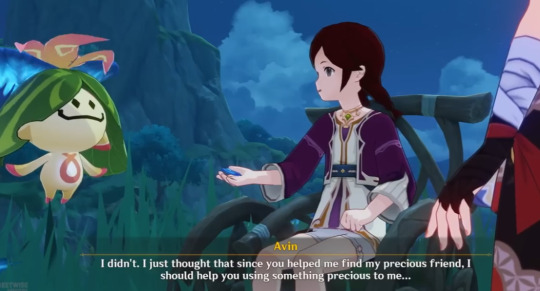
And the whole thing just smacks of a fundamental misunderstanding of why adults can't see the aranara in the first place. It's not because there's some sort of magical "You must be 18 or younger to see aranara" rule. It's because the aranara themselves choose not to be seen by adults. They protect themselves by making themselves invisible. They're not invisible by nature! Everyone can see them--when the aranara want to be seen. Conversely, this means that adults with "childlike wonder" are not just automatically seeing aranara left and right. No matter how happy and childish at heart an adult is, they will only see an aranara if the aranara personally trust them and want to be seen.
The aranara trust children because children are generally good-hearted (and also probably easy to escape from), so there is usually no need to keep themselves invisible to children, but even among children, they are invisible until they choose to be seen. (I think everyone forgot the quest where you find the child who was kidnapped by the Fatui in the forest, saved by an aranara who chose to reveal itself to her, but then she refuses to go back to the village, so you leave her at the aranara nursery--only the aranara there at the nursery choose not to reveal themselves to her because they don't know her yet.) Even with children, aranara don't just go running up on them--they're incredibly cautious creatures who only show themselves after they're sure they'll be safe. They distrust adults because adults deliberately use "growing up" as an excuse to abandon simplicity, kindness, and gentleness in order to embrace concepts that include getting ahead of others and seeking profit--two things which could be particularly dangerous for a vulnerable forest fairy population.
There's also an extremely complicated intersection between the aranara and memory, as they represent and upon "death" return to being the forest's living memory itself. Avin, the girl in Yoimiya's story quest, is a child--but still loses the ability to visit her aranara companion because her illness keeps her away from the forest so long that she simply forgets her aranara buddy ever existed. Even aranara who would love to continue playing with their human companions find themselves forgotten over and over again, because they simply don't linger in human memory well. It's a giant metaphor for how fleeting and temporary human existence is in comparison to the natural world! It's a metaphorrrrrrr.
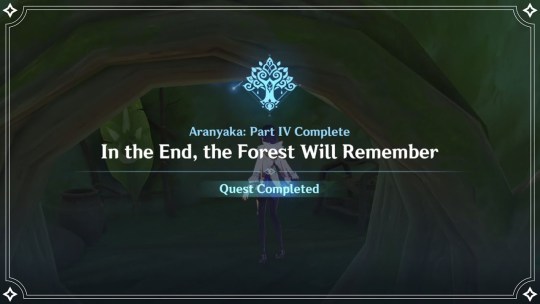
(There's also the fact that aranara freely move between reality and dreaming--something which Sumeru's adult population only recently regained the ability to even do.)
And like... does no one remember that Yoimiya could only see the aranara because Traveler was there to introduce her to them? She doesn't just automatically see them even though she has all the childish wonder possible in her heart.
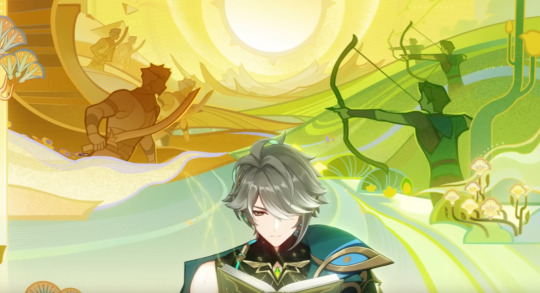
I even saw tweets saying that anyone who thinks Alhaitham doesn't have child-like wonder in his heart and wouldn't automatically be able to see aranara fundamentally misunderstands his character and I just... First, see the point above--this is already a misunderstanding of how aranara work.
Second, am I just crazy, or is there absolutely nothing about having wonder and curiosity and passion for the world around you that is confined to children? Are we really going with "Having an imagination is for kids" as our takeaway from all this?
Alhaitham absolutely is passionate! He loves Sumeru as much as Nahida does! The mysteries of the world fascinate him, and he wants to be doing nothing more than ravenously learning and taking in new information at every opportunity!
But finding wonder and joy in life's mysteries is absolutely not restricted to children!
There's nothing inherently "childish" about loving fiction and the fantastical world of books, having a vivid imagination, being passionate about learning new things, and just plain out enjoying life. I'm sorry everyone else has apparently become such miserable adults that the only way they can believe Alhaitham finds joy in the world is by assuming he must have maintained a "child-like" inner nature. Please go read more books and touch more grass and maybe you too will experience adult wonder and joy???
Alhaitham's vivid curiosity about the world isn't remotely "child-like." It's based on the same sort of philosophical obsessions that drove Plato and Aristotle to redefine human thinking. To Alhaitham, Sumeru is likely much more vivid and beautiful and full of intrigue because he is now an adult who has the ability to freely think, formulate deeper questions, and the means to pursue research into his personal passions. His teaser trailer is literally about how he took the job of the Scribe because the Scribe records truth--not child-like faith in the magic of the world, but a constant unfilled yearning to get closer and closer to what is real.
If Alhaitham can see aranara, it's because he's earned the trust of the aranara by his deeds, not because he's secretly still an innocent, sweet baby boy deep down who has chosen not to grow up. (And like, if "traumatized people don't see aranara" is really what we're going with, are we actually arguing Kaveh is the only traumatized, "grew up too soon" one here? Did everyone just forget Alhaitham is an orphan with zero surviving family members left in the world and that he spent his entire childhood friendless, at least as far as we've been shown?)
Winning the trust of the aranara is something anyone could do if they show strong enough positive traits--just basic kindness, gentleness, and patience, which I promise you, adults can have.
At the very least, if we're going to suggest Alhaitham is child-like, can't we at least point to his actual childish behaviors, such as constantly pulling Kaveh's pigtails like a schoolboy with his first crush? Throwing hands with anyone who pisses him off too much? Being a jokester who continually sends Paimon books because she picked on him for his choice of reading materials once? At least y'all could have started there... Come on, now.
Phew, this really was a whole rant, but I just needed to get that off my chest. The Hoyo fandoms on twitter are so, so bad. Like man, don't claim people are mischaracterizing someone while not even knowing the lore yourself... Sorry if that sounds harsh, but...
#genshin impact#alhaitham#aranara#frankly I think if Alhaitham actually can see aranara#the most logical explanation is just that he has a bombass memory#and never forgot his own childhood aranara buddy in the first place#if you don't forget#you don't have to stop seeing#the aranara explicitly lose trust in humans#when those humans make the conscious choice to say goodbye to their past#drawing the line between the memories of childhood#and their new memories as an adult#I did not spend two weeks crying over Arama for y'all to mess up aranara lore like this
163 notes
·
View notes
Text
The post: You can’t say Lily Evans was a feminist because a person with feminist awareness wouldn’t marry a privileged cishet man who abused his power by being a bully right in front of her.
The Snaters: LILY WAS FREE TO CHOOSE JAMES, DID YOU EXPECT HER TO CHOOSE SNAPE?
Me: At what point did I say she had to choose someone? At what point did I say I ship her with Snape? At what point does questioning a character’s political mindset turn into reducing her to an object of desire between two men?
Of course Lily was free to marry whoever she wanted; I have no problem with that. My issue is with people trying to portray her as some kind of feminist icon of the 70s when there is nothing in the canon to suggest that, and when that theory is contradicted by her life choices. A feminist woman from the 70s wouldn’t marry the class’s rich bully, wouldn’t end up with a hyper-toxic white guy who spent his time abusing classmates, wouldn’t end up with a spoiled and obnoxious brat who publicly stripped a working-class classmate against his will. And this has nothing to do with whether Lily should have ended up with someone else. Lily should end up with whoever she wants—no one is debating that. What’s being debated is the attempt to portray her as a feminist icon when she simply wasn’t.
Lily was a white girl from the 70s who was completely alienated from the patriarchal structures of her time, only cared about social issues that directly affected her, and chose a traditional life that was entirely in line with the patriarchal expectations for women of her era. She was not a revolutionary, she was not a feminist—she was a teenage mother who married her high school boyfriend, who happened to be a rich jerk. And saying that does not imply in any way that she should have chosen another man. The fact that Snaters are so obsessed with this just proves that all their so-called progressive rhetoric online is pure performance, because anyone with even a minimal understanding of the subject would never assume that criticizing a female character’s political stance means she has to pick one man over another.
Honestly, what a drag. But what’s even more exhausting is how all these people attack not only by twisting your words and making completely irrelevant statements but also by trying to argue their points with nothing but fan theories and assumptions based on their own biases or whatever fandom content they consume as if it were gospel. And the moment you counter them with canon-based arguments, suddenly, they decide the conversation is over and that they’re going to "leave it at that." Because, of course, the moment canon gets thrown in their faces, it turns out they have no ground to stand on, and their arguments are invalid because they’re built on nothing but the pillars of their imagination—so they have to retreat to avoid embarrassing themselves further.
I’ve said it over and over: I don’t care if people come to throw hate my way, and I don’t care if people come to debate. But if they do, at least have the guts and the dignity not to run away with their tails between their legs when I completely dismantle their cheap hate-filled discourse—because, honestly, it’s as embarrassing as it is disappointing.
#lily evans#james potter#lily evans critical#james potter was a bully#james potter was an absolute dick#anti james potter should be called anti privileged jerks#severus snape#pro severus snape#snapedom#snaters#snaters are dumbs as hell#pro snape#feminism#harry potter fandom#dead gay wizards from the 70s
94 notes
·
View notes
Text
canon jiang cheng
making my own post instead of reblogging someone else's with my hater commentary. praise my three atoms of emotional maturity.
salt below the cut. the post is long so i can concentrate all my salt into one location.
i just saw a post complaining about jc stans trying to take over the "canon jiang cheng" tag. personally, i do think us stans should just let the haters have that one, since picking fights is just going to cause more trouble for everyone. but also.
there is exactly one reason why this is happening, and it isn't just that jc stans are annoying.
in all honesty, the jiang cheng frequently discussed in the "canon jiang cheng" tag is as much of a fandom invention as the jiang cheng conjured by the most ardent of jc stannies. i have seen the level of analysis typical of the "canon jiang cheng tag," and - to speak frankly - the frequenters of this tag are every bit as prone to wild invention and free flights of fancy as the rest of the fandom. when posts claiming that jiang cheng sold an unwilling jiang yanli to the jins, or that jiang cheng regularly whips jin ling, or that jiang cheng directly killed wei wuxian, are all tagged with "canon jiang cheng," it is safe for anyone with a brain to say that we have in fact moved quite a distance away from canon.
so when these people casually declare their equally fanonical interpretation of a character to be the one and only "canon," from the perspective of the rest of us, all we see is condescension and an entirely undeserved arrogance.
is it any wonder the jc stans are annoyed?
actually, let's take a closer look at what's going on here. even if the "canon jiang cheng" tag was intended at any point in its conception to actually be used for discussion of jiang cheng's canon traits - this is no longer the case. in practice, the "canon jiang cheng" tag is used for jiang cheng bashing. if i went into the "canon jiang cheng" tag today, do you think i'd find posts about jiang cheng's canon height or canon love of dogs, or even screenshots of the mdzs text wherein jiang cheng is mentioned? no. every post i found would be about how jiang cheng sucks - and with wildly varying levels of fidelity to canon, to boot.
if every post in your tag is about how a character sucks, and adherence to canon in said posts is optional, then what you have is not a canon analysis tag. what you have is a character bashing tag.
and yet. if you ask these people why they're tagging their character-bashing as "canon," all you get is wide-eyed innocence. this isn't character bashing, they insist, this is just analysis of his canon traits. this is even when the post in question contradicts canon directly. and when posts that are canonically accurate but not jiang-cheng-negative appear in the "canon jiang cheng" tag? these users so kindly move to correct this behavior: don't you know, they politely inform the offender, that this tag is for canon behavior only? your post about how jiang cheng might have had a shred of love in his heart at one point in his life is not canon.
they want at once the exclusivity and full-agreement nature of a character-bashing tag, and also the veneer of superiority lent by the label "canon." and by claiming the label of "canon" for themselves only, they aim not just to lend credibility to their own opinions, but also to automatically discredit everyone that disagrees with them. they want sole ownership over "canon" - and to declare every other jiang cheng analysis out there, so long as it isn't sufficiently jiang-cheng-negative, as mere fandom invention.
guys. come on. what is this? you do realize that if you tell someone that they can't tag their analysis with "canon," then you're basically telling them that you think they're wrong, don't you? every time you say "oh this post is about canon jiang cheng," you do realize that what you're actually saying is "my analysis is based in canon, while yours is fandom invention" - that what you're actually saying is "i'm right and you're wrong," don't you? if so, own up to it! if you're going to disagree with someone, disagree with them openly! none of this simpering "uwu canon jiang cheng actually" bullshit - say with your full chest that you think that everyone else's takes are shit, and why!
if you're going to be a hater, just own up to it and call yourself a hater! don't be a coward. don't be so condescending and disingenuous with your cowardice, either. why are you emulating the cardboard bullshit version of jin guangyao peddled only by the most deluded of jiggy antis?
and - for once - recognize that if it is acceptable for you behave in a certain way towards others, then it is also acceptable for others to behave in the same way towards you. if you're going to tag your blatantly canon-violating bullshit with "canon jiang cheng," then you do not have the right to get mad when jc stannies tag their equally canon-violating bullshit with "canon jiang cheng" as well.
#mdzs#jiang cheng#yanyan speaks#yanyan haterpost#and this is coming from someone who's never posted anything in the “canon [character in question]” tag
134 notes
·
View notes
Text
I'm begging and screaming for the people that say "attachment doesn't mean love" to rewatch the Prequels. You don't even have to rewatch the fucking Clone Wars. It is literally the most obvious thing that attachment, yes, does in fact mean love. No, Anakin saying "Jedi are encouraged to love" in AotC does not prove you right, it's him saying "well technically I'm allowed to love" in a very tongue-in-cheek manner, blatantly implying that he's actually breaking the rules (on another note, some people on here really like flip-flopping on whether or not Anakin is a reliable narrator, and it seems to solely depend upon whether or not they agree with what he's saying). It's about as subtle as a semi truck. Plus, the entire time that he's married to her he has to keep his relationship secret because his relationship is, y'know, forbidden. He has to hide that she is pregnant because his relationship to her is, in fact, forbidden.
Since y'all love bringing up what George Lucas said about what attachment actually means, riddle me this: why would he write an entire forbidden romance subplot contingent on the Jedi forbidding things like romantic relationships if the Jedi didn't, in fact, forbid romantic relationships? There's two options here: either George Lucas is an even worse writer than we thought, or he's doing the interview version of retconning shit on Twitter. Since people ignored JKR even before she became prolific bigot, I think it's safe to assume most people think Word of God means jack shit if they're actively retconning core aspects of their work. So Lucas's word is utterly worthless in this argument regardless of his intentions.
Another blatantly obvious bit of proof that attachment=love is the fact that Jedi can't have relationships with their birth family. Full stop. There is no ambiguity to whether or not this is true, there is no George Lucas interviews for you to hide behind; this is irrevocably canon. And there is quite literally no legitimate excuse for the Jedi to do this. All excuses for this, canonical and fandom, circle directly back to "attachment is forbidden", and it is so painfully funny to watch the few people willing to defend this. Most don't even try though, and just ignore this issue entirely, because it is a glaringly obvious contradiction to their glorified headcanon on attachments that they so desperately want to uphold.
You know, I remember back when people on TikTok were freaking out about people not having media literacy. And I remember thinking during that entire time "You guys thought people ever had media literacy?" This portion of the Star Wars fandom in particular is walking proof that media literacy never died, it was already dead the second humanity invented storytelling.
Some disclaimers because some people in this fandom are particularly fond of using straw men and ad hominem, as well as just trolling:
-I don't think the Sith are good guys. You should watch me play KOTOR 1 and count the amount of times I call the Sith assholes, dumbasses, or scum. I very much hate them.
-I don't think that Order 66 was justified. This really shouldn't have to be said, but some people on this platform have rendered this necessary.
-People can headcanon that attachment and love are different things. My problem is when people start treating it as canon and try to force other people too as well.
-Criticizing the Jedi does not mean I am criticizing Buddhism. Even if it did, I will criticize any religion I damn well please because the "It's My Religion" card immediately loses validity the second you physically or psychologically harm other people, especially children. However, the Jedi philosophy on attachment and the Buddhist philosophy on attachment are different, so this argument doesn't hold any water to begin with.
-You are free to like the Jedi. I encourage you to do so. I am not, and never will tell you that you can't.
-I really shouldn't have to make these disclaimers to begin with, but since this is the internet and people don't read the words on the page anymore, I unfortunately have to spell shit out with crayon.
Also, I can and will use the block button. If you engage in bullying or harassment, engage in bad faith arguments, or otherwise say fundamentally false or incredibly stupid shit, I will block you. If you can't handle that, then don't engage with this post. I am not making this post in hopes that you will actually listen to me, because the people that this is directed at don't listen, and don't want to. If you truly disagree with what I've said in this post on such a fundamental level that you need to make a long-winded reply about how everything I've ever said is wrong, please just scroll — dealing with that shit is actually exhausting.
#star wars#jedi critical#star wars prequels#prequel trilogy#Attachment does equal love#and I'm tired of people pretending it doesn't#discourse#don't like don't interact#not anti Jedi because I don't hate them#we don't deny facts in this house just because they refute our arguments#block button will be used if necessary#star wars fandom#fandom#please be civil
65 notes
·
View notes
Text
Submas canon vs fanon
The entire time I have been in the Submas fandom I have seen a lot of confusion about what is canonical and what is a wide-spread fanon. Both in the sense of people thinking things were canon when they were not, and (more rarely) people thinking things were fanon when they were not. So I thought it might be useful to put together a little guide.
Of course, there is nothing wrong with using fanon. I use most of these headcannons in my own fics because I like them and canon is dumb anyway. (Note: pokemon is a huge sprawling mass and tends to contradict itself, and there have been changes across the various games/manga/anime)
All quotations are taken from bulbapidia.
Nimbasa Trio - FANON
Elesa has no connection to Ingo and Emmet besides living in the same place. There is one interaction between them in Pokemon Masters, and while they are on friendly terms they don't appear to be particularly close. Similarly, the idea that Ingo likes bad puns/Emmet does not stemmed from their fanon friendship with her.
Uncle Drayden - FANON
The only confirmed family Ingo and Emmet have are each other.
Cilan is a huge fan - CANON
Cilan is a fanboy of both of them in the anime.
Ingo is the older twin - CANON
In the original Japanese Emmet calls Ingo "nii-san" which means older brother.
"Do you have any siblings? I have an older brother, Ingo."
- Emmet, pokemon masters
Emmet's joltik hoard - FANON
Emmet's galvantula knows the move cross poison. This is an "egg move" which can only be learnt through pokemon breeding. Since it would take several tries to get this move it probably would have left Emmet with a lot of Joltik. In theory. We don't see Emmet with joltiks in canon.
Ingo's kitty smile - CANON
He smiles like that in the manga. (Admittedly, it's not as exaggerated as the full on :3 people sometimes draw him with.) He also briefly smiles in PLA, but less cat-like.
Ingo's perpetual frown is unintentional - CANON
"<player>! Someone just told me something that troubled me deeply! They said that compared to Emmet, I'm too stiff! But that's just a misunderstanding! I know I smile when I'm having fun! I'd even say that I'm quite proud of how expressive I am when I speak! What? You say you've never seen me smile? I-is that so..."
- Ingo, Pokemon Masters
They are both autistic - FANON
They are related to the twin heros - FANON
They share similar themes and motifs to the twin heros/Zekrom/Reshiram but that's it. They have no canon relationship.
Both of them are heavily coded as autistic. However, it's never been directly stated in the games that they are autistic and (to my knowledge) nobody at Game Freak/Nintendo has confirmed anything.
Ingo has a receding hairline - (debatably) CANON
He is drawn with one in the art book. Does the art book count as canon? Until something in the main games says otherwise, probably. (Though there is some argument to be had that it might be an unflattering haircut instead.)
Ingo arrived in Hisui via wormhole - FANON
"For my part, I simply found myself one day here in Hisui, a region whose name I'd never heard... All I could remember was my own name. I was still standing there in bafflement when the Pearl Clan came to my aid."
- Ingo, PLA. (However, the art book depicts the pearl clan finding him facedown on the ground, so take his standing claim with a grain of salt)
We still don't know how he got there. Similarly, it is quite common to show Ingo arriving during a blizzard/freezing to death and generally in poor health/injured/unconsciousness. But the way he recounts it sounds much more peaceful.
It'a also common to have Sneasler be the one to find him. The art book (of dubious canon) shows a human pearl clan member finding him, and Ingo's quote seems to confirm that. It's possible Sneasler was involved but she isn't mentioned.
Ingo got amnesia from hitting his head - FANON
We don't know how he got amnesia.
Ingo remembers Emmet as "the man in white" - FANON
"I'm starting to recall a man who looked... like me. We'd battle and discuss Pokémon, I think... The words "I like winning more than anything else" flashed through my mind just now..."
- Ingo, PLA, about Emmet
He makes no mention of remembering Emmet wearing white or smiling.
Ingo calls her "Lady Sneasler" - FANON
Ingo only calls her Sneasler, no Lady. In fact, nobody calls her or any of the ride pokemon Lord or Lady because...
The ride pokemon are noble pokemon - FANON
There are 10 blessed pokemon descended from the heros of old, and these pokemon are revered by the clans and have wardens. The blessed pokemon are divided into two groups, the rides and the nobles.
The ride pokemon are not called noble pokemon, and they do not get titles. Mai talks about "the great Wyrdeer" but does not call him lord or noble.
"This suggests that even Pokémon that are not nobles can become frenzied..."
- Kamado, PLA, about the ride pokemon Ursaluna seemingly becoming frenzied
Ingo lives in Sneasler's cave - FANON
We don't know where he lives.
Ingo became a Warden because Sneasler liked him - FANON
"I showed a natural affinity for taming Pokémon, which is why I eventually became a warden. But still I wonder what my true purpose is here..."
- Ingo, PLA
There is no further information about his wardenship. There is no information on what his relationship with Sneasler was prior to him becoming her warden.
Ingo likes having photos because of the amnesia - CANON
"Ah, photographs. I appreciate having physical keepsakes—less ephemeral than memories. Would you do me the honor of posing for a photo with me, <player>?"
- Ingo, PLA, at the Photography Studio
Ingo has been in Hisui for XX years - CANON
The art book uses the placeholder XX for the amount of time Ingo has been in Hisui. Some have taken the double digits to mean 10+, however the first digit could easily be a 0. So, we still don't know. Net 0 information.
Emmet must be taking Ingo vanishing badly - FANON
We have not heard from Emmet.
***
That's all for now! I'm sure I've missed or forgotten something, feel free to add stuff in the reblogs! I might edit the list later to add more if needed.
796 notes
·
View notes
Text
I’m so sorry but my ass will NEVER shut up about how the writers came up with an honestly GOOD conflict with the Binary Bros in Part One, only to immediately drop everything that made it interesting in Part Two :-:
Putting my rant under the cut bc idk who’s gonna wanna hear this yapfest
Like, my biggest gripe is how they had Demetri bring up The Arm during his and Hawk’s fight for the flag, only to never mention it again. When he brought it up, a lot of people, including myself, thought that Part Two would probably explore that repressed hurt a little more. Because surely the writers wouldn’t write that into the script if they had no use for it!! Right? RIGHT???? (they did, in fact, end up not using it)
They could’ve used their conflict to make them have a very needed conversation about everything that happened between them in Seasons 2 and 3, because it’s very clear that they never properly addressed that, but they didn’t. Instead, their conflict was handled in what was probably the worst way it could’ve been.
They kept adding on all these new arguments for them to have, all of which were petty as shit and I could not care less for. The cheating plot especially gets me pissed because though I’m a firm believer that Demetri and Yasmine are both raging faggots, the writers aren’t and have been writing Demetri as genuinely being all over her, and that Demetri would NEVER cheat on her (he literally calls her his goddess like nuh uh he’s not a cheater on my soul).
And not only that, but everything they did had NO VALUE!!! All their “arguments” had no substance, especially since they weren’t even really fighting!! Wdym Demetri was supposedly extremely pissed at Hawk, but then they’re sitting together like normal at the bar? Wdym they’re suddenly ganging up on Kenny together?? IT MAKES NO SENSE!!!
Speaking of the Kenny thing, it directly contradicts Demetri’s character for him to be suspicious of Kenny. He was suspicious of him because he immediately forgave Devon for the laxatives, but he did that EXACT SAME THING in Season 3!! And his was worse!! He immediately forgave Hawk for months of torment and for BREAKING HIS ARM!!!! I mean, the writers COULD HAVE used that as an opportunity to have him actually reflect on that and ask himself why he decided to be so forgiving if he’s suspicious of Kenny for doing so, but guess what? THEY DIDN’T!!!!!
Hawk’s line to Demetri telling him to not do shitty things if he didn’t wanna face consequences is also extremely contradictory, considering the fact that he’s done some of the most shitty things out of all the teens on the show!! ESPECIALLY TO THE GUY HE WAS SAYING THAT LINE TO!!!!! Hawk did a bunch of shitty things to Demetri, but he never faced any consequences for them! He faced consequences for betraying Cobra Kai mid-house-fight through them shaving his mohawk, and he faced consequences for being a general asshole through him being an outcast in the beginning of Season 4, but he never faced any consequences SPECIFICALLY for what he put Demetri through. Again, the writers COULD HAVE used it for some reflection, BUT THEY DIDN’T!!!! GOSH!!!!!
Their conflict this season was SOLELY a plot device to make them uncoordinated and therefore bad at fighting because the writers knew that if they were coordinated then they would’ve been slamming all those other wack ass dojos from the beginning. That was it. Both characters came out largely unchanged, if not worse, than before.
The locker room make-up scene was good, but it irks me when I remember that none of their REAL problems were solved by it. I start tweaking out when I remember that they’re still never gonna be able to actually talk about their issues. Like wdym it’s canon that Demetri still has some kind of repressed hurt over having his arm broken but is never gonna actually address it :(( the dick CANNOT be that good for him to keep forgiving and forgetting im begging 😭🙏
TLDR: I’m tweaking out way too much over fictional gay people
#I’m still tweaking out about this#this probably doesn’t even make any sense but I don’t care#WHY bring up the arm if they aren’t gonna bring it up again like what was the point genuinely#it feels like them in Part One and them in Part Two were written by entirely different people#hashbrown let demetri get mad at hawk/eli for everything he did to him 2024#hashbrown let him have trauma over the time his bestie held him down and snapped his arm in half 2024#binary boyfriends#hawkmetri#demetri alexopoulos#eli moskowitz#cobra kai#ck
79 notes
·
View notes
Text
The Weirwood Files: Why Rhaenyra is the Rightful Heir
Subject: A short essay detailing why Rhaenyra is the rightful heir over Aegon.
This shouldn’t even have to be said, but I am seeing an uptick in team green fans claiming that Aegon was always the rightful heir, as if him being king was not enough for them. I personally believe this argument comes from wanting the greens to have the legal right of way so they have no guilt in supporting Aegon (although even if Aegon DID have the law on his side, there is still sympathy to be had for Rhaenyra being cheated out of inheritance that had been promised to her). Regardless, this write up will compile all the evidence that proves Rhaenyra was the rightful heir and was unlawfully usurped.
First and foremost, Westeros is an absolute monarchy, which means it is run by one ruler who is not held to the law and is above it. The king has vassals, advisors, council members, but overall there is no power that “checks” the king. This system was put into place by Aegon I Targaryen, and he is described as the “final authority” on all governance in the realm.

Many people refer to this passage below as proof that Westeros is not an absolute monarchy, but notice where it says that Aegon allowed the other lords of the land to rule as they had been and keep their laws intact. However this only occurs because the king decides it so, he is still the final authority on matters, and yes, that includes inheritance matters as well. Inheritance laws do not exist above the king, it is still very much the other way around.

In addition to the text evidence, we also have George himself confirming Westeros being an absolute monarchy, per this article.
The idea of a woman becoming a monarch while a firstborn son lives has been brought up twice before the dance. Rhaena Targaryen was a potential candidate for the throne despite having a living brother. The throne did not go to her not because it would be illegal to do so, but because she did not press her claim, and allowed it to pass to Jaehaerys.
Alysanne suggested that Daenerys become queen despite having a living brother, Aemon. Alysanne was one of the most politically competent queens, and if law truly prevented Daenerys being queen over Aemon, she would not suggest it so casually.
Many cite the Great Council called by Jaehaerys, something that set a precedent for male heirs, as a reason for why Aegon is heir over Rhaenyra. However, the council’s decision was not solidified into law. Precedents can be set, with new precedents contradicting them. Jaehaerys did not have to call a council, and he did not have to abide by it. He merely chose to do so.
When Viserys made Rhaenyra heir, he called the lords of the land to swear oaths to her in an official ceremony. The titles that belong to the heir of the throne were then bestowed upon Rhaenyra. This was never undone. Rhaenyra was never stripped of her status as heir, not even by Aegon’s birth. Aegon, in turn, is never once referred to as heir within the text.
In both book and show canon, we can see that this is true. In Fire and Blood, we have a passage that says Alicent and the greens had asked for the succession to be changed, meaning that the succession was set in stone. Aegon was never heir, the greens just wished him to be so.

In the show, we have Jason Lannister in 1x03 say “--If you were to name Aegon as heir,” once again highlighting that despite being a male firstborn son, Aegon is not automatically heir. The greens would not be asking for the succession to be changed if Aegon was already heir, instead they would be referring to Aegon as heir already and pleading for Viserys to acknowledge this as fact. Once again, while laws, however loose they may be, exist, the king is the final authority in the realm. Viserys had the right to name Rhaenyra as his heir, and he has the right to keep her as heir despite Aegon being born.
Let’s also not forget Aemond directly stating that Rhaenyra was usurped in 2x01 during his scene with Criston, and Otto’s “is that what you think?” to Aegon when he claimed Viserys wanted him to be king. Aegon was put on the throne not because of the law, but because of the green’s schemes and ambitions. This is also why in the book they do not attempt to claim legality but instead perform a coup and act in secrecy. If Aegon were truly heir all along and only Viserys was denying it, there would be no need for such.
TL;DR: Rhaenyra is and always was the rightful heir under the law of Westeros and Aegon was a usurper. A water is wet essay but it needed to be said in full.
#hotd#house of the dragon#fire and blood#rhaenyra targaryen#anti aegon ii targaryen#pro team black#pro rhaenyra targaryen#anti team green#theweirwoodfiles
112 notes
·
View notes